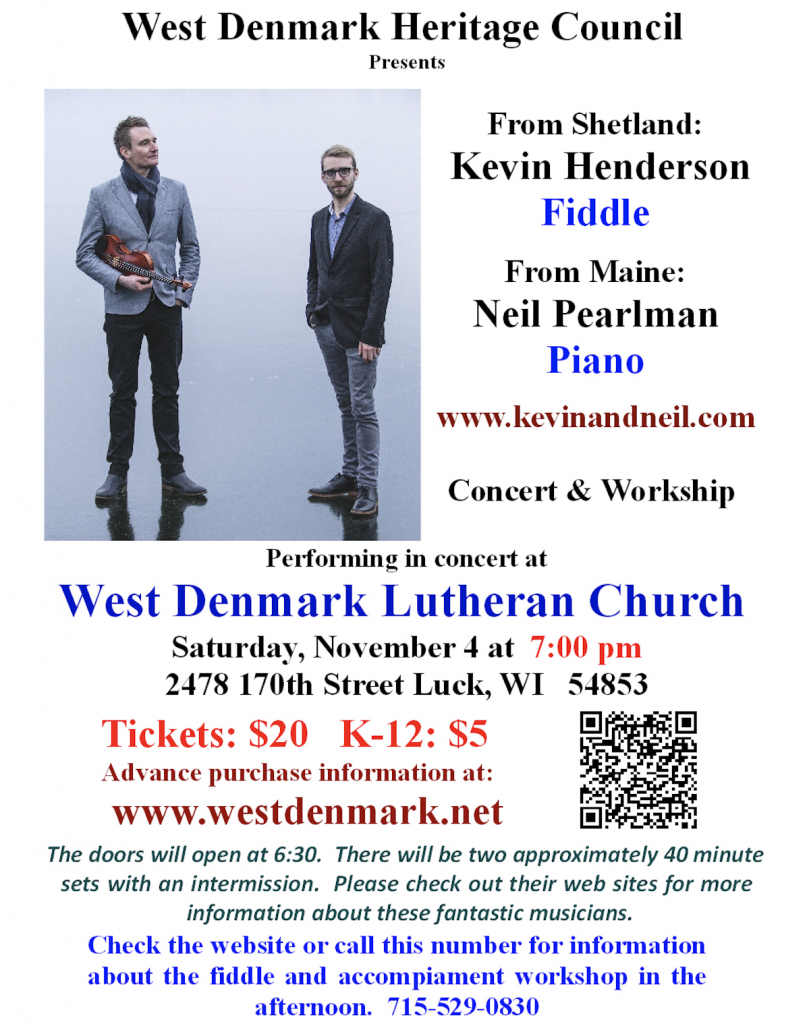
Concert ~ November 4th

Luck, Wisconsin

Last week we heard about Isaac and his near death experience. As we know, the knife in Father Abraham’s hand was quickly repurposed – used to cut the cords that bound Isaac instead of being used to kill him, and a ram was sacrificed in his place. These events took place to everyone’s great relief – perhaps to God’s as much as to the other principal players.
This week Isaac is an old man. Nothing much is told of the intervening years except that he marries Rebekah and they have sons – non-identical twins, Esau and Jacob.
In Genesis chapter 25 the boys are born. Jacob comes into the world gripping his brother Esau’s heel. His name means “to follow” or “to come behind” or “heel grabber” and we will soon learn that he is one. Jacob is a scoundrel, a trickster. Brotherly love is not in his tool bag. In the second episode related about their lives, Esau returns home, famished, from a long day of hunting, and the scheming Jacob greets his hungry brother with a pot of stew bubbling on the stove. Esau wants the stew; Jacob wants the firstborn’s birthright. For the price of bread and lentil soup, Esau swears an oath relinquishing his rights.
These boys might not be role models for intelligence in one case, or integrity in the other, but they are real models – they seem like real people. Sibling rivalry, skewed family values, jealousy, favoritism, greed, disappointment, deceit – it’s all here in the Bible and in the families that might live in your neighborhood. There are cultural differences, but the dynamics are familiar.
The story continues: Genesis 27 :1-4, 15-23
“When Isaac was old and his eyes were dim so that he could not see, he called his elder son Esau and said to him, “My son,” and he answered, “Here I am.” Isaac said, “See, I am old; I do not know the day of my death. Now then, take your weapons, your quiver and your bow, and go out to the field, and hunt game for me.”
But Rebekah was listening and told her favorite son Jacob to bring two choice kids in from the flock outside their door; and she made a feast and took the best garments of her elder son Esau, which were with her in the house, and put them on her younger son Jacob; and she put the skins of the young goats on his hands and on his neck. Then she handed her son Jacob the savory food and the bread that she had prepared. So he went in to his father, and said, “My father”; and he said, “Here I am; who are you, my son?” Jacob said to his father, “I am Esau your firstborn. I have done as you told me; now sit up and eat of my game, so that you may bless me.”
But Isaac said, “How is it that you have found it so quickly, my son?” He answered, “Because the Lord your God granted me success.” Then Isaac said to Jacob, “Come near, that I may touch you, and know whether you are really my son Esau or not.” So Jacob went up to his father Isaac, who felt him and said, “The voice is Jacob’s voice, but the hands are the hands of Esau.” His father did not recognize him, but, because his hands were hairy like his brother Esau’s hands; so Isaac blessed him.
Even though Isaac isn’t entirely convinced that he’s got the right son, he bestows the blessing based on touch and smell and food. He exclaims: “Ah, the smell of my son is like the smell of a field that the LORD has blessed. May God give you the dew of heaven, and the fatness of the earth, and plenty of grain and wine. Let peoples serve you, and nations bow down to you. Be lord over your brothers, and may your mother’s sons bow down to you. Cursed be everyone who curses you, and blessed be everyone who blesses you!”
That’s it; the blessing has been spoken. It cannot be retracted or repeated.
When Esau returns home and discovers the deceit he is in a rage, but what can he do? In summing up what has just happened to him, Esau alludes to yet another meaning of Jacob’s name when he says, “Is he not rightly named Jacob? For he has supplanted me these two times. He took away my birthright; and look, now he has taken away my blessing.”
Jacob “the deposer, deceiver, double-crosser.”
Jacob crosses every line that presents itself in the story. No rule, no tradition, no relationship appears to be out of bounds as he schemes to get what he wants. In short order, he alters the line of inheritance, disrupts the chain of blessing, disrespects his father, and puts his brother out in the cold. I hope you don’t have a brother like this.
But Jacob’s win isn’t decisive – it isn’t even obvious. His is not a happily-ever-after, healthy-wealthy-and-wise kind of blessing.
In fact, in the next episode, Jacob is on the run. He has won what he wanted from his father, but can’t stay around to enjoy it. Esau, in addition to being hairy, must be quite a bit bigger than Jacob, and could beat the stuffing out of him – and Jacob, having pulled off the heist of a lifetime, but expecting retribution, finds himself on the run – alone, somewhere between the home that he has left behind and the refuge he seeks with his mother’s brother. His path leads through the wilderness – through the place where demons dwell.
In this next section of reading, Jacob is portrayed as a fugitive fleeing for his life; a vagabond wandering between a conflict-ridden past and an uncertain future. How hollow his stolen blessing must feel about now, with a stone for a pillow and the Milky Way his only covering.
Chapter 28 (10-17)
“Jacob left Beer-sheba and went toward Haran. He came to a certain place and stayed there for the night, because the sun had set. Taking one of the stones of the place, he put it under his head and lay down in that place. And he dreamed that there was a ladder set up on the earth, the top of it reaching to heaven; and the angels of God were ascending and descending on it. And the Lord stood beside him and said, “I am the Lord, the God of Abraham and the God of Isaac; the land on which you lie I will give to you and to your offspring; and your offspring shall be like the dust of the earth, and you shall spread abroad to the west and to the east and to the north and to the south; and all the families of the earth shall be blessed in you and in your offspring. Know that I am with you and will keep you wherever you go, and will bring you back to this land; for I will not leave you until I have done what I have promised you.”
Then Jacob woke from his sleep and said, “Surely the Lord is in this place—and I did not know it!” And he was afraid, and said, “How awesome is this place! This is none other than the house of God, and this is the gate of heaven.”
So, contrary to appearances, Jacob is not alone. The dream reveals that his resting place is full of busy angels, divine “messengers.” These beings are purposeful in their coming and going on steps joining earth to heaven. They are on the move doing God’s work in the world, and he is surprised to discover that he has been a guest in the “house of God.”
In his dream, God repeats the promises made to Abraham and Isaac for land and heirs and prosperity, to be blessed in order to be a blessing to others, but there is also a promise that is unique to Jacob. God promises to bring Jacob back home. Partly, this is a promise that speaks to his unique situation of being on the run, but also, it stands as a promise many generations into the future. I’ve said before that this book of scripture probably received its final editing during the time of Israel’s exile in Babylon – which would make this promise to their forefather all the more poignant.
When Jacob awakens from his dream he finds to his surprise that the place has not been changed by God’s presence. He looks around – the desert is not blooming, there are no snow angel prints in the sand – but Jacob is changed. Professing God’s presence in this rather ordinary place, he builds a monument of remembrance, converting his “pillow” into an altar in the world. He calls this place without a name “Bethel” — which means the house of God.
Jacob’s discovery that God is in this place – and the fear he feels – remind us that God is in every place, each rock and tree and field and pond bear the presence and activity of the divine. It’s worth a little fear. This land is only ours for a generation. It belongs to the future and to the past. We are stewards for only a moment. The trees will outlive us, the piles of stones we pull out of a field, the polyester pollution we leave behind, the plastic islands in the oceans. Is this not worth building an altar of stones set here and there to bump our shins against to help us remember?
In what seemed like a desperate, lonely flight, Jacob discovered that he is in good company.
Just as Jacob left his home in Beersheba, so God departs from his “house” in the heavens to join Jacob on the road. The blessing is on the move. We aren’t told why Isaac had only one blessing to give, leaving Esau to weep and plan for revenge when he arrived too late and found that Jacob had taken the blessing, but when God renews the promises of land and descendants, God compares Jacob’s descendants to dust: “your offspring shall be like the dust of the earth, and you shall spread abroad to the west and to the east and to the north and to the south; and all the families of the earth shall be blessed in you and in your offspring.”
The metaphor spreads divine blessing far and wide. Dust blows around, it settles deep and thick in some places, produces a fine covering in others. Dust floats in the air – little moats refracting sunlight. Compared to the single blessing Isaac had to give, God seems to be indiscriminate – or at least exponential.
Jacob’s story is a long one, and for a story that’s 3 to 4000 years old, it’s quite well written and interesting. I commend it to you. Through the twists and turns it follows the path of blessing – teaching us something along the way. Jacob doesn’t get what he wants simply because he wants it and because he’s been blessed. And Esau doesn’t seem to suffer for not receiving his father’s blessing. After 20 years they are reunited. Jacob is a wealthy man – wealthy in terms of wives, children, flocks and herds and staff. He separated from his father-in-law and is coming back home when he learns that Esau has gotten word and is heading out to meet him. Esau is coming with 400 men. Jacob feels an old dread rising: Esau and his murderous threats. He strategizes to protect his wealth and placate his brother, dividing his family and herds sending them ahead in different batches while he stays behind on the far side of the river, pacing in the dark, accompanied only by his schemes and fears. And in the starless night, he is attacked.
Genesis 32:24-31
24Jacob was left alone; and a man wrestled with him until daybreak. 25When the man saw that he did not prevail against Jacob, he struck him on the hip socket; and Jacob’s hip was put out of joint as he wrestled with him. 26Then he said, ‘Let me go, for the day is breaking.’ But Jacob said, ‘I will not let you go, unless you bless me.’ 27So he said to him, ‘What is your name?’ And he said, ‘Jacob.’ 28Then he said, ‘You shall no longer be called Jacob, but Israel, (The one who strives with God) for you have striven with divine and human beings and have prevailed.’ 29Then Jacob asked him, ‘Please tell me your name.’ But he said, ‘Why is it that you ask my name?’ And there he blessed him. 30So Jacob called the place Peniel,(the face of God) saying, ‘For I have seen God face to face, and yet my life is preserved.’ 31The sun rose upon him as he passed Peniel, limping because of his hip.”
Jacob’s story reaches a climax here at the Jabbok river ford. He doesn’t do much after this, the narrative soon passes on to his children. But we’re given this episode to think about our struggles with God. The scene is dark and broody and confusing. The dialog ambiguous. This encounter with God has no ray of starlight beaming through the terror of Jacob’s dark night of the soul, there’s nothing comforting in the sound of silence as Jacob paces. Instead he is pounced on from behind. He ends up struggling, fighting, grappling with God.
It’s not such a far-fetched tale. It happens on the world stage and in individual lives. Have you ever felt tripped up or pounced upon or under attack by God? And are there times when you wrangle with God just to fight, because you don’t know how else to face the pain of some situation? We hang on, demanding something good to come from the struggle.
Jacob wouldn’t let go of his adversary until he received a blessing, but the end seems more like a tie than a triumph; an exhausting fight to the death, that ends not with death but with a wounding, a mark, a limp, a sign that the God of blessing doesn’t keep one safe, that we may strive and wrestle and still not be particularly enlightened, but rather that the process itself might be the blessing.
If Jacob’s story speaks a truth about us, it also speaks a truth about God.
Wrestling is the most intimate sport. God is not content to stand aloof and direct matters from afar. God is engaged bodily, face to face, breath to breath. One can’t keep much dignity wrestling. As we continue to read, it becomes clear that God is willing to lose all dignity for the sake of his beloved creation and creatures, to become as humbled and vulnerable as it takes to save us and transform us and connect to us.
Jacob walks away. Before he crosses the river and continues toward his meeting with Esau, he names the place of his struggle. Peniel – here I met God face to face and yet I survived. When Jacob and Esau do meet, completely at odds with Jacob’s expectations, Esau runs forward to embrace his brother, and kisses him and weeps, and Jacob – stunned – says “Truly, to see your face is like seeing the face of God, for you have received me with such favor.”
Being reconciled to God opened Jacob’s eyes to be reconciled with his brother, and to see God in his brother’s face.
This story doesn’t have a clear moral or obvious meaning, but it lifts up several things – the value and importance of struggling with God, with faith, with our identity; the value and importance of confession and asking for forgiveness, of reconciliation; the value and importance of claiming the name that God bestows. Names can limit us, hurt us. But names can also heal and make alive.
And so a part of what we do each week, I believe, is to be reminded once again of our name in God’s sight and our identity in Christ, so that we might go out into the world reconciled and forgiven, as God’s own beloved, and – stunned by it – see and pronounce – perhaps even with words – the face of God in all whom we meet. And this story reminds us, again, that being blessed doesn’t necessarily show, or change our situation according to our timeline of expectation. God’s blessings tend to show best, most clearly, in hindsight. If you can see a blessing at the time it is bestowed, build a little altar in the world to mark the spot and give thanks.
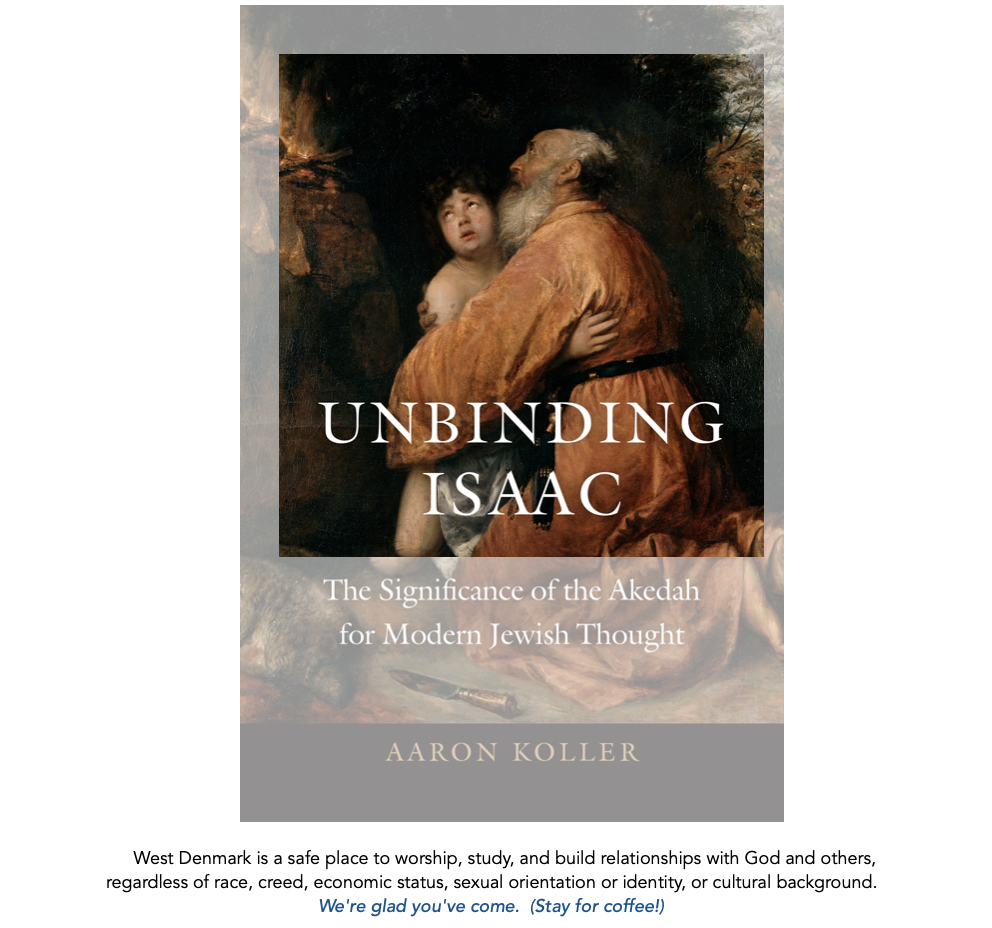
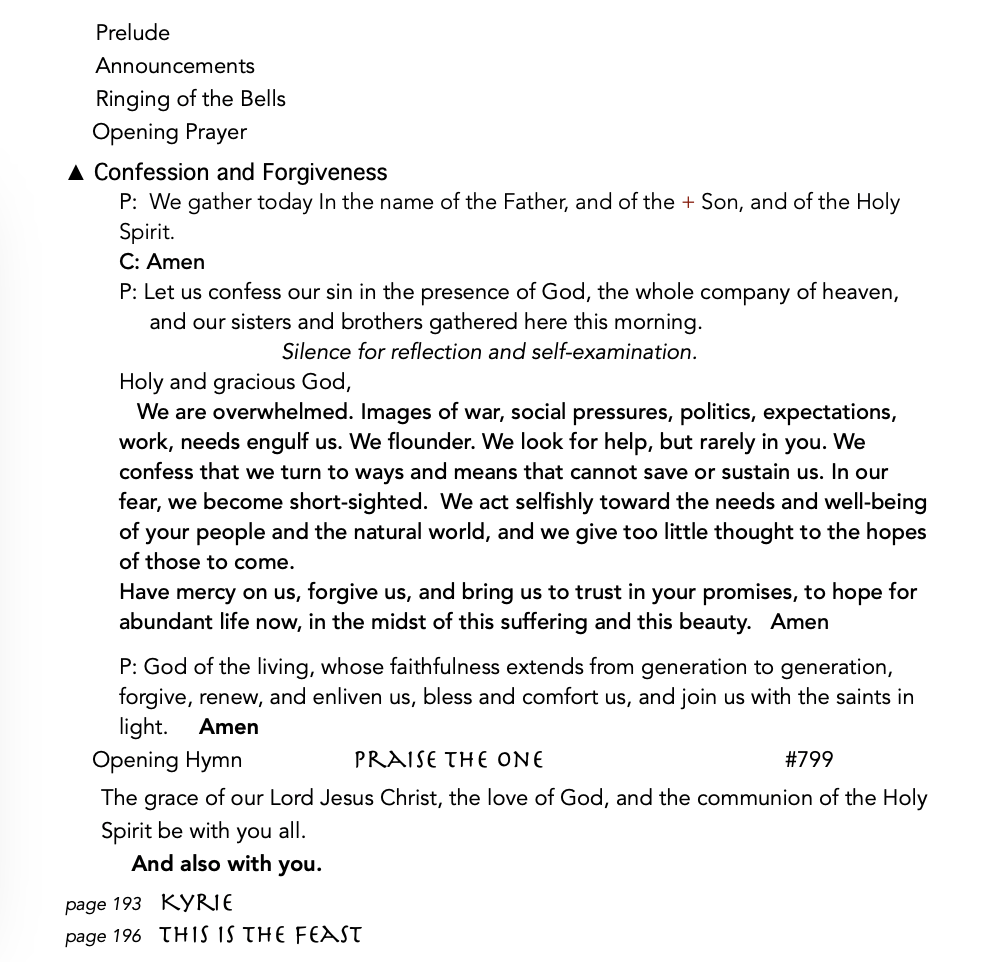
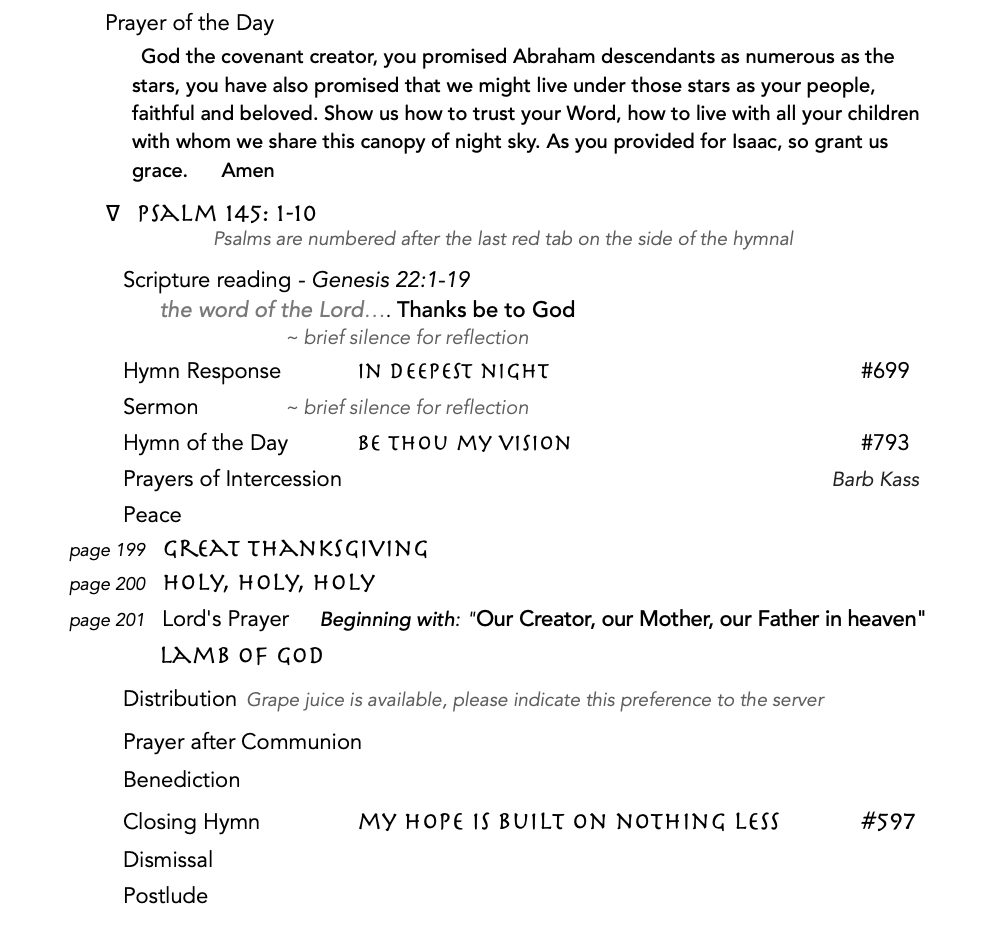
A couple years ago, I don’t remember how many, one of you asked if I would preach on the texts and stories that aren’t chosen by the lectionaries, so that we aren’t cycling through the same set every three or four years, but would get a broader view of scripture.
I think this is a good idea – but it’s a bumpy ride, because the texts and stories not chosen are often not chosen for a reason – they are difficult or complicated to listen to and think through, and, to be honest, most congregations don’t want to try. People generally come to church to be inspired, to leave feeling good, with a vague sense of familiarity with what is being preached, and don’t come expecting to leave with difficult questions hanging in the air. Cain and Abel, for example, don’t appear in any preaching cycle. Theirs is not a particularly edifying tale… but still it is important and an interesting story on many levels. I think Genesis is a book to read and to work through – and, especially in light of what’s happening in the Middle East between Palestinians and Jews this week, these stories are amazingly pertinent. So, these are the reasons I’m picking my way slowly through instead of hitting the high points and best loved episodes. My perspective on Genesis is that the early chapters are attempting to tell us about the nature and will of God and the nature and ways of people… and to point out the gulf that separates these natures.
The key, I believe, is to read Genesis through the lens of, “You shall love the Lord your God with all your heart and soul and strength and mind, and you shall love your neighbor as yourself.” That should be the banner heading each week. I believe that is the heart and essence of God’s will for us. It was to be the guiding principle of the ancient Israelites and it is what Jesus taught and lived 2000 years later. I think these early, mythic stories are told to explain our behavior and our difficulties with living this ethic, of upholding this minimum standard of life before God.
Last week we pulled a thread of Abraham’s saga to follow Sarah’s part in the covenant and the promise of Isaac. The thread tugs at two other stories. After Isaac’s birth, Sarah decides that Ishmael (Abraham’s son with her handmaid/slave) is competition for her own son’s inheritance. She tells Abraham to send Hagar and Ishmael out of the camp, out into the desert to wander and die. Abraham is loth to do this because it is his first-born son, but God tells him it will be okay, and in fact, God hears Ishmael’s cries and provides for them, repeating the promise to Hagar that Ishmael will become the father of a mighty nation. That storyline ends in this way: 21:20 “God was with the boy, and he grew up; he lived in the wilderness, and became an expert with the bow. 21He lived in the wilderness of Paran; and his mother got a wife for him from the land of Egypt.” Ishmael and Isaac reunite a few chapters later to bury their father. Judaism credits Abraham through Ishmael to be the father of the Arab people, and Abraham through Isaac to be the father of the Jews. After Hagar and Ishmael leave, we are told that Abraham, his family and itinerant herder household continue to prosper as resident aliens in the land of the Philistines. There is a seemingly random interlude at the end of chapter 21 describing a peaceful co-existence covenant that Abraham forms with King Abimelech and the establishment of the well of Beer-sheba.
And then, when Isaac’s storyline picks up again, we wish that it hadn’t.
Genesis 22
After these things God tested Abraham. He said to him, ‘Abraham!’ And he said, ‘Here I am.’ 2He said, ‘Take your son, your only son Isaac, whom you love, and go to the land of Moriah, and offer him there as a burnt-offering on one of the mountains that I shall show you.’ 3So Abraham rose early in the morning, saddled his donkey, and took two of his young men with him, and his son Isaac; he cut the wood for the burnt-offering, and set out and went to the place in the distance that God had shown him. 4On the third day Abraham looked up and saw the place far away. 5Then Abraham said to his young men, ‘Stay here with the donkey; the boy and I will go over there; we will worship, and then we will come back to you.’ 6Abraham took the wood of the burnt-offering and laid it on his son Isaac, and he himself carried the fire and the knife. So the two of them walked on together. 7Isaac said to his father Abraham, ‘Father!’ And he said, ‘Here I am, my son.’ He said, ‘The fire and the wood are here, but where is the lamb for a burnt-offering?’ 8Abraham said, ‘God himself will provide the lamb for a burnt-offering, my son.’ So the two of them walked on together.
9 When they came to the place that God had shown him, Abraham built an altar there and laid the wood in order. He bound his son Isaac, and laid him on the altar, on top of the wood. 10Then Abraham reached out his hand and took the knife to slay his son.
11But the angel of the Lord called to him from heaven, and said, ‘Abraham, Abraham!’ And he said, ‘Here I am.’ 12He said, ‘Do not lay your hand on the boy or do anything to him; for now I know that you fear God, since you have not withheld your son, your only son, from me.’ 13And Abraham looked up and saw a ram, caught in a thicket by its horns. Abraham went and took the ram and offered it up as a burnt-offering instead of his son. 14So Abraham called that place ‘The Lord will provide’; as it is said to this day, ‘On the mount of the Lord it shall be provided.’
15 The angel of the Lord called to Abraham a second time from heaven, 16and said, ‘By myself I have sworn, says the Lord: Because you have done this, and have not withheld your son, your only son, 17I will indeed bless you, and I will make your offspring as numerous as the stars of heaven and as the sand that is on the seashore. And your offspring shall possess the gate of their enemies, 18and by your offspring shall all the nations of the earth gain blessing for themselves, because you have obeyed my voice.’ 19So Abraham returned to his young men, and they rose and went together to Beer-sheba; and Abraham lived at Beer-sheba.
The word of the Lord……. Thanks be to God
Sarah was wrong, of course.
So was Cain.
They assumed love is a zero-sum game. God chose Abel’s offering. Ishmael was Abraham’s firstborn son. Therefore, Cain and Sarah reasoned, in order for the second to ‘win’ the father’s affection and recognition, the first must be removed from the equation. Love can’t possibly encompass both equally, favoring this one’s art or that one’s scope while cherishing both together.
I think we would say that God’s love can easily, readily, willingly, whole-heartedly, eagerly cherish not only both, but all. But that fear, that kind of self-doubting envy of the other runs deep. It’s the scarcity model – always fearing there won’t be enough for us if someone else gets plenty. We understand the logic of Cain and Sarah even as we cringe at their actions. And we don’t believe that God acts in that way, being the God of creation and love. We believe God is loving and good. And so we are shocked by scriptures like today’s.
“Abraham.” “Here I am, Lord.” “Take your son, your only son Isaac, whom you love, and go to the land of Moriah, and offer him there as a burnt-offering on one of the mountains that I shall show you.”
Where did this come from? The cherished, promised son through whom, according to God’s word, Abraham and Sarah create nations and kings, this son is to be killed?
God’s logic is illogical.
And God’s request is ungodly.
The neighboring religious cults practiced human and child sacrifice, we are told, but the God of Israel, the one God, the God of life, always condemned it. Punished it. And Abraham, who came back time and again to argue and bargain for the lives of those in Sodom didn’t speak a word of protest? “3So Abraham rose early in the morning, saddled his donkey, and took two of his young men with him, and his son Isaac; he cut the wood for the burnt-offering, and set out and went to the place in the distance that God had shown him.”
We don’t know which of these aspects of the story is worse.
Jewish rabbis and scholars since Medieval times onward have left behind written explanations and ponderings about this, too, of course. I try to read Jewish commentaries as well as Christian thought. The Akedah, as this passage is called, meaning “the binding,” became in Jewish thought the supreme example of self-sacrifice in obedience to God’s will and the symbol of Jewish martyrdom. Both Abraham and Isaac were bound. Abraham is hemmed in behind and before. How does one find a way forward when the choice is between love of God and love of your own God-given child?
Christian Bible headings call this story the sacrifice of Isaac. Christian commentaries (not surprisingly) jump to Christ – there are so many similarities in the language and imagery to God’s beloved, innocent son, who carried his own wooden cross to the place of death, three day’s journey through the wilderness, the sacrificial lamb God would provide, like a ram caught in the thickets, discovered as a substitute for our death. It’s all there in this ancient story. And it’s fine and beautiful in prefiguring the Christian faith – except that in this reading and others in the Old Testament, God rebukes human sacrifice, staying the hand of Abraham.
In Hebrew it’s called the binding, and that is helpful, because there are four characters who are bound. Isaac, of course is tied with the cords of death. We don’t hear much from him on this journey, other than his wondering about the lamb for the sacrifice as he carries the wood on the way up the mountain. The lamb, Abraham assures him, God will provide.
Abraham, too, is bound. He has followed the guiding hand of God for decades believing in the promise of heirs and descendants. Finally, at a very old age, when his wife Sarah was beyond the way women, they are given this beloved son whose name means delight and laughter. And God, who has promised progeny as numerous as the stars, as plenteous as the sands of the shore, now says offer this only child of promise as a sacrifice. We are told it is a test, Abraham is not told that. For Abraham to disobey the command of God is wrong, and to obey this command of God is wrong. Abraham is stuck between the love of a father for his son and the love of God with whom he has a history and who asks – who demands – to be trusted. It is a terrible, fraught, binding place to be.
Sarah is not part of the story. She is not mentioned either biblically nor rabbinically. However, we have affinity for Sarah. She is bound by silence, by gender, by the cloak of invisibility. She is an unseen, unrecognized victim of this word of God. In Sarah, we find a person to embody our agent-less suffering, our inability to understand, the taken-for-grantedness of those occupying the background of life… Sarah is us, in our human condition, bound by the indeterminacy, the necessary incompleteness of God’s plan, the effect of decisions and actions that fan out beyond the predictable, expected conclusions.
But God, too, is bound.
God is bound to our limited understandings, our misunderstandings of God’s will and way, our misunderstandings of God’s voice.
As it stands, this story is a polemic against the sacrifice of human lives for the mistaken understanding of God’s will. God’s love overrides God’s law. “For I desire steadfast love and not sacrifice, the knowledge of God rather than burnt offerings.” God says through Hosea. “A broken and contrite heart, a humble spirit are acceptable offerings,” the psalmist says for God.
In the 1967 Six-Day War, when for the first time the generation of founders were too old to fight, and their children fought in their place, the akedah remained a powerful symbol. In a post-war collection of interviews, The Seventh Day: Soldiers Talk About the Six-Day War (Hebrew: Siaḥ Lohamim, 1967; English, 1970) a father is recorded who said: “We do knowingly bring our boys up to volunteer for combat units…. These are moments when a man is given a greater insight into Isaac’s sacrifice. Kierkegaard asked what Abraham did that night. What did he think about? … He had a whole night to think…. It’s a question that touches on the very meaning of human existence. The Bible says nothing about it… For us, that night lasted six days” (p. 202).
The weariness and pain of the akedah come to the front after the Yom Kippur war. The poet Menahem Heyd writes: “And there was no ram – /and Isaac in the thicket.// And the angel did not say lay not/ and we – / our son, our only son, Isaac.” (“Yiẓhak Halakh le-Har Moriah” (“Isaac Went to Mount Moriah”), Yedi’oth Aharonot, December 28, 1973.)
The pain is particularly intense because no ram came to replace Isaac.
This current version of the war between Israel and Palestine is a war of extremists willing to sacrifice their sons and daughters, their souls for a cause. It is political, not religious, not godly, not a holy war. There is no one to stay the hand of slaughter. There is no ram caught in the thicket. Palestinians are not Hamas, they are people forced from their land and homes by Israeli settlers and walls. And Jewish people are not the state of Israel to be sacrificed for political means or exterminated. They are people. We watch the news with horror and fear for where this war will run over and spill out of the small container of Gaza and Israel and the West Bank. We pray for a ram to be spotted in the thicket, some new alternative, some faithfulness to the God of love and recompense… some hope.
Abraham’s test still speaks. “Are my human creations capable of trust,” wonders God. “Are they capable of listening for my voice, of discerning the way of life in the midst of Chaos and death?”
Abraham’s test speaks to the binding of our lives — choices we have to make when it seems no right choice can be made, or those times when we are carried along, swept up within a powerful force without choice, or when our voice isn’t heard, times when we seem to occupy the acted upon background.
How do we hear God’s word when it contradicts our will? Do we listen beyond our fear, or follow, or trust, or open our minds to the possibility of a ram stuck in the thicket behind us? How do we unbind Isaac? Do we have the nerve to answer, “Here I am. Speak, Lord, and I will listen?” Jesus complained of those who have eyes but do not see, ears but do not hear. The life of faith is not one to undertake without our whole hearts and intellect and strength. It demands no less than the best, most flexible, adaptable, creative spirit we have to offer.
In the early rabbinic period, the Akedah found it way into the people’s public prayers of intercession and it stands for you: “May the God who answered Abraham our father on Mount Moriah answer you – hearken to the voice of your crying this day, and loose the cords of your binding.”
Peace be yours this day.
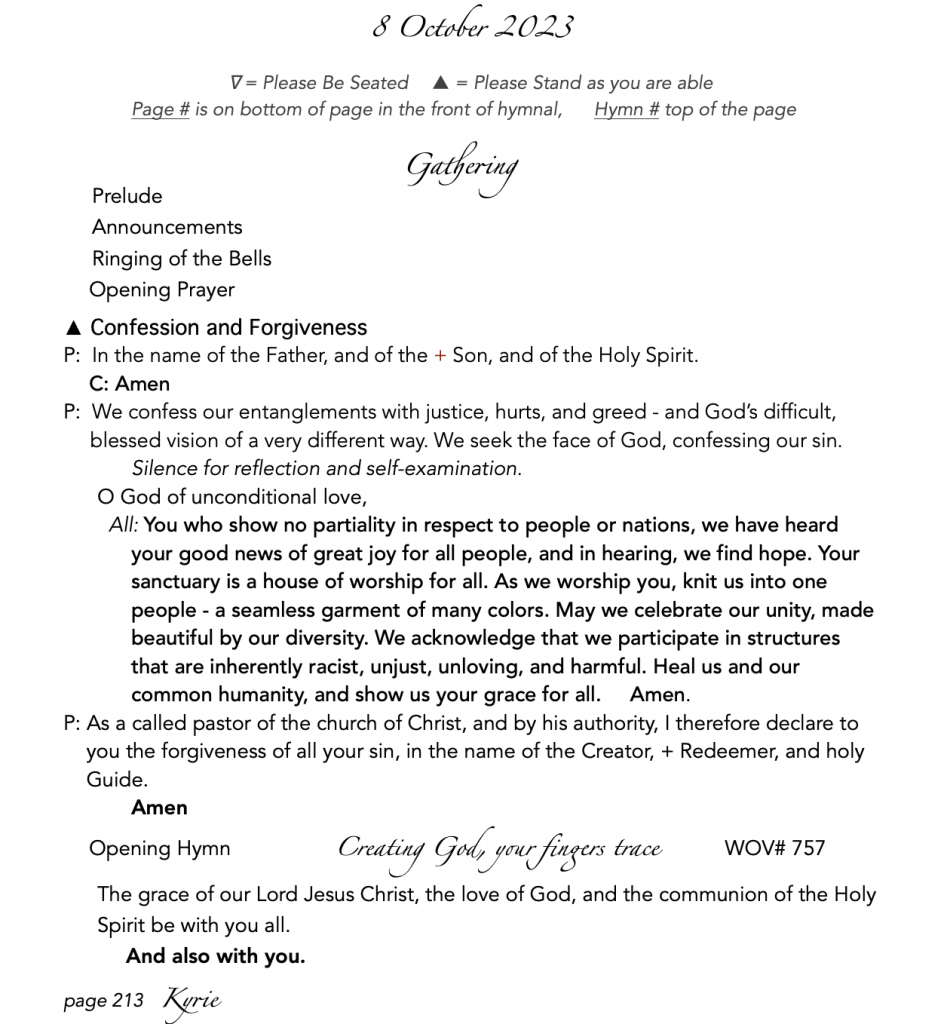
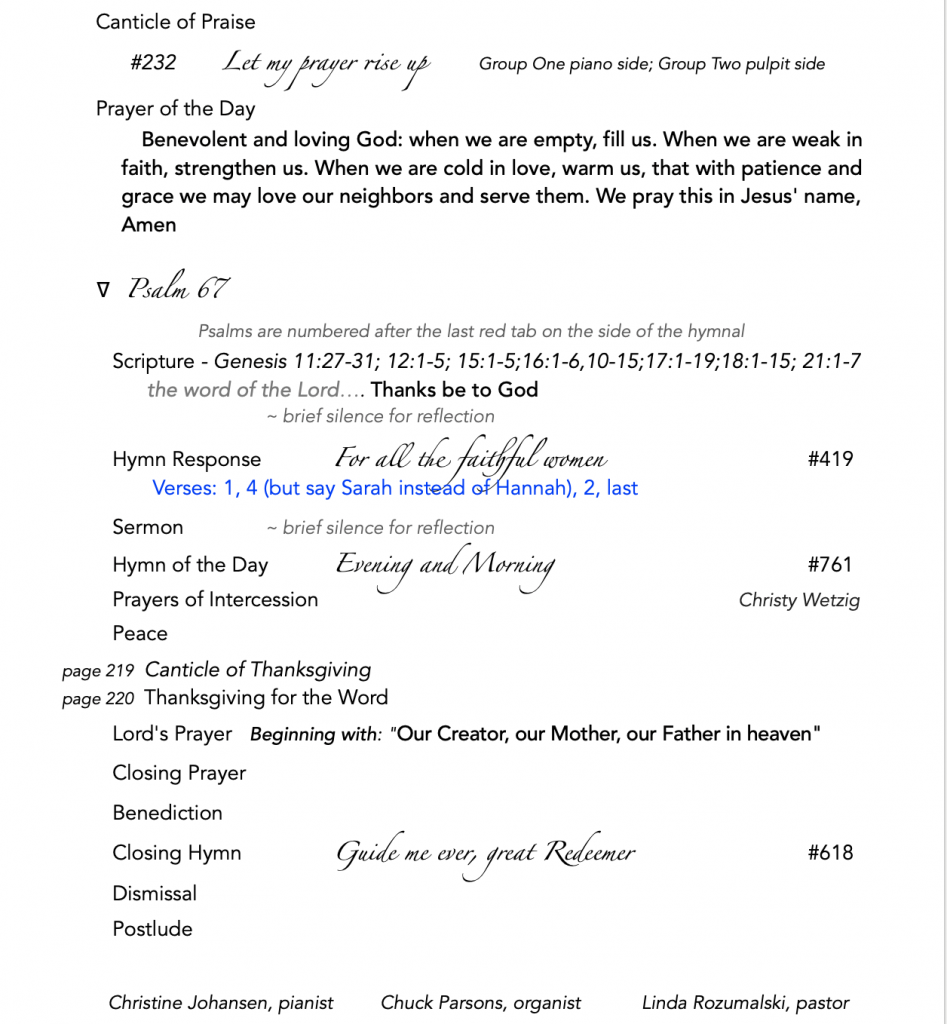
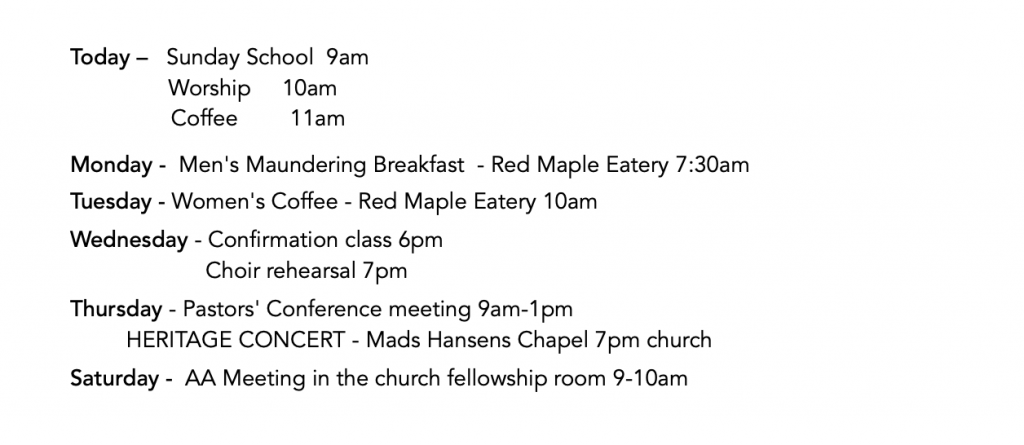
Genesis 11:27-31; 12:1-5; 15:1-5; 16:1-6,10-15;17:1-19;18:1-15; 21:1-7
Abraham and Sarah populate one of the longest narratives of the Bible. As you can tell by the verses listed, I’m skipping a lot of the story in order to get you out by noon. I’m not even telling the best parts. The red thread I’m following is the promise God made to Sarah. The last two sections are the appointed readings for the day. But our story begins at the end of Genesis chapter 11 as the list of Noah’s descendants winds up.
11:27 “Terah was the father of Abram, Nahor, and Haran; and Haran was the father of Lot. 29Abram and Nahor took wives; the name of Abram’s wife was Sarai. 30Now Sarai was barren; she had no child.
31 Terah took his son Abram and his grandson Lot, son of Haran who had died, and his daughter-in-law Sarai, and they went out together from Ur of the Chaldeans to go into the land of Canaan; but when they came to Haran, they settled there.
12:1 The Lord said to Abram, ‘Go from your country and your kindred and your father’s house to the land that I will show you. I will make of you a great nation, and I will bless you, and make your name great, so that you will be a blessing. I will bless those who bless you, and the one who curses you I will curse; and by you all the families of the earth shall bless themselves.’
So Abram went, as the Lord had told him; and Lot went with him. Abram was seventy-five years old when he departed from Haran. Abram took his wife Sarai and his brother’s son Lot, and all the possessions that they had gathered, and the persons whom they had acquired, and flocks and herds; and they set forth to go to the land of Canaan.
15:1 The word of the Lord came to Abram in a vision, ‘Do not be afraid, Abram, I am your shield; your reward shall be very great.’ 2But Abram said, ‘O Lord God, what will you give me, for I continue childless, and the heir of my house is Eliezer of Damascus? You have given me no offspring, and so a slave born in my house is to inherit this reward.’ 4But the word of the Lord came to him, ‘This man shall not be your heir; no one but your very own issue shall be your heir.’ 5He brought Abram outside and said, ‘Look towards heaven and count the stars, if you are able to count them.’ Then he said, ‘So shall your descendants be.’
16:1 Now Sarai, Abram’s wife, bore him no children. She had an Egyptian slave-girl whose name was Hagar, 2and Sarai said to Abram, ‘You see that the Lord has prevented me from bearing children; go in to my slave-girl; it may be that I shall obtain children by her.’ And Abram listened to the voice of Sarai. 3So, after Abram had lived for ten years in the land of Canaan, Sarai took Hagar the Egyptian, her slave-girl, and gave her to her husband Abram as a wife. 4He went in to Hagar, and she conceived; and when she saw that she had conceived, she looked with contempt on her mistress.
6But Abram said to Sarai, ‘Your slave-girl is in your power; do to her as you please.’ Then Sarai dealt harshly with her, and she ran away from her.
9The angel of the Lord found Hagar by a spring of water in the wilderness,10and said to her, ‘I will so greatly multiply your offspring that they cannot be counted for multitude.’ 11‘Now you have conceived and shall bear a son; you shall call him Ishmael, for the Lord has given heed to your affliction. 15 Hagar bore Abram a son; and Abram named his son Ishmael. 16Abram was eighty-six years old when Hagar bore him Ishmael.
17:1 When Abram was ninety-nine years old, the Lord appeared and said to him, ‘I am El Shaddai, the God Almighty; walk before me, and be blameless. 2And I will make my covenant between me and you, and will make you exceedingly numerous.’ 3Then Abram fell on his face; and God said to him, 4‘As for me, this is my covenant with you: You shall be the ancestor of a multitude of nations. 5No longer shall your name be Abram (exalted ancestor), but your name shall be Abraham (ancestor of a multitude). 6I will make you exceedingly fruitful; and I will make nations of you, and kings shall come from you. 7I will establish my covenant between me and you, and your offspring after you throughout their generations, … to be God to you and to your seed. 8And I will give to you the land where you are now an alien for a perpetual holding; and I will be the God of you.’
God said to Abraham, ‘As for Sarai your wife, you shall not call her Sarai, but Sarah shall be her name. 16I will bless her, and moreover I will give you a son by her… and she shall give rise to nations; kings of peoples shall come from her.’
17But Abraham fell on his face and laughed, and said to himself, ‘Can a child be born to a man who is a hundred years old? Can Sarah, who is ninety years old, bear a child?’ And Abraham said to God, ‘O that Ishmael might live in your sight!’ 19God said, ‘No, but your wife Sarah shall bear you a son, and you shall name him Isaac. (which means ‘he laughs’)
18:1 One day, the Lord appeared to Abraham by the oaks of Mamre, as he sat at the entrance of his tent in the heat of the day. 2He looked up and saw three men standing near him. When he saw them, he ran from the tent entrance to meet them, and bowed down to the ground. 3He said, ‘My lords, if I find favor with you, do not pass by your servant. 4Let a little water be brought, and wash your feet, and rest yourselves under the tree. 5Let me bring a little bread, that you may refresh yourselves, and after that you may pass on—since you have come to your servant.’ So they said, ‘Do as you have said.’ 6And Abraham hastened into the tent to Sarah, and said, ‘Make ready quickly three measures of choice flour, knead it, and make cakes.’ 7Abraham ran to the herd, and took a calf, tender and good, and gave it to the servant, who hastened to prepare it. 8Then he took curds and milk and the calf that he had prepared, and set it before them; and he stood by them under the tree while they ate.
9 They said to him, ‘Where is your wife Sarah?’ And he said, ‘There, in the tent.’ 10Then one said, ‘I will surely return to you in due season, and your wife Sarah shall have a son.’ Sarah was listening at the tent entrance behind him. 11Now Abraham and Sarah were old, advanced in age; it had ceased to be with Sarah after the manner of women. 12And Sarah laughed to herself, saying, ‘After I have grown old, and my husband is old, shall I have pleasure?’ 13The Lord said to Abraham, ‘Why did Sarah laugh, and say, “Shall I indeed bear a child, now that I am old?” 14Is anything too wonderful for the Lord? At the set time I will return to you, in due season, and Sarah shall have a son.’ 15But Sarah denied, saying, ‘I did not laugh’; for she was afraid. He said, ‘Oh yes, you did laugh.’
21 The Lord dealt with Sarah as he had said, and the Lord did for Sarah as he had promised. Sarah conceived and bore Abraham a son in his old age, at the time of which God had spoken to him. Abraham gave the name Isaac to his son whom Sarah bore him. Abraham was a hundred years old when his son Isaac was born to him. Now Sarah said, ‘God has brought laughter for me; everyone who hears will laugh with me.’ And she said, ‘Who would ever have said to Abraham that Sarah would nurse children? Yet I have borne him a son in his old age.’
I have included this long list of occasions in which the promise of an heir was made for a couple of reasons.
One is that it shows the span of years that Sarah and Abraham waited. She knew she was barren all along, so we might wonder how much stock she actually put in the word of Abraham the first three times when he told her the Lord had spoken to him about being the father of nations. At any rate, these two old people are accustomed to hopelessness in this regard. Given their ages, the length of their marriage, I imagine they might even be sleeping in different tents.
Anticipation has surely flagged in the 24 years between the first time the promise was given to a 75 year old Abram and this latest iteration. The time was past. Sarah was barren, still.
The only difference this time is that Sarah hears it, too.
And she can’t help but laugh. She laughed to herself, and then denied it out of fear. These words interest me. In email or texting, one can’t read in the inflection to aid interpretation; one can’t see facial expressions – all we have is the words that can be – and usually are – misinterpreted. And the little smiley faces – emojis that try to give a sense of meaning.
So, what kind of laughter do you imagine Sarah laughed? The Oxford dictionary says this about laughter: “Most commonly, it is considered an auditory expression of a number of positive emotional states, such as joy, mirth, happiness, or relief. On some occasions, however, it may be caused by contrary emotional states such as embarrassment, surprise, or confusion such as nervous laughter or courtesy laugh.”
I’ve always pictured Sarah, hiding behind the tent flap, leaning in, overhearing every word, suddenly bursting out with a loud, impulsive guffaw. She can’t help it. I mean look at her. Look at Abraham, ten years her senior. “Shall I indeed have pleasure,” she says? There is a healthy dose of skepticism in that laugh.
Perhaps, though, it is complete mirth: a girly, incongruous, joyous giggle. She is looking forward to it – to the whole prospect, the whole promise, the rounded belly, breasts no longer wrinkled and saggy. And the funny, transformed self image makes her titter.
Or, perhaps, Sarah has had a bit too much of Abraham – his noteworthy attempt to pass her off as his sister, giving her to the pharaoh was a selfish act on Abraham’s part to save his own life at the expense of Sarah because he knew she was barren and so now ‘harm’ cold come from it. Great thinking. Coming on the back of that, this might sound like a bit too much, “You gotta be kidding me,” she laughs with derision.
Or, maybe Sarah is thinking of Hagar and Ishmael, and of regaining her stature, her place in the hierarchy of women in the camp. And she laughs as one who’s been given the last laugh.
Or perhaps she was telling the truth. Maybe Sarah didn’t laugh at all, but was expressing ridicule and scorn. “Who the heck does this stranger think he is. We’ve had enough of this nonsense. I’m 90 years old! Take your full stomach and get on your way; leave us in peace.”
We don’t know what she thought of this news – except that she laughed to herself as she overheard the news and that laugh was in turn overheard by God who noticed – and she was afraid. ‘Oh yes, you did laugh.’ Maybe Sarah was afraid that God doesn’t have a sense of humor when one is certainly needed. Most likely, she is embarrassed and was suddenly afraid of these three very odd guests who can read minds and knew her name and promise her, at last, the child long promised to Abraham. For an old woman to bear a child and give birth… there’s a lot to be afraid of. I put a picture of my mom and her great grandchild on the bulletin to give a bit of reality to the concept.
But, again, as in the past week’s stories, this is’t told as documented history or a case study in geriatric pregnancy. It’s told about God, the nature of God. The word translated as ‘wonderful’ – “is anything too wonderful for God?” Is translated other places as extraordinary. I like that meaning of it here. Is anything too out of the ordinary for God to do or to notice? The Bible could have begun with the Law or with the histories when they put the books in order. But they started with retelling their origin stories to establish that God was there from before the beginning, forming, choosing, guiding them as a nation, but told through individuals. God is that concerned, that involved, that specific.
The second reason I added all those readings is to establish the sense of prolonged waiting for the promise. The final form of Genesis is believed to have been compiled by editors during or shortly after their return from exile in Babylon in the 6th century BCE. These were people needing desperately to hear a word of promise that there is new life possible born out of the barrenness of their exile experience. Returning home was almost worse than being captive, because there was nothing left of their homes, their villages, cities, temple. Foreign people were living on their land, calling it home.
What did God’s promise mean to them now? What good was it? They had been gone for a full generation. Isaiah had spoken of the desert bursting into bloom, springs gushing up, a highway appearing to usher them home. What kind of laughter do you imagine they produced faced with the reality of their barrenness, their hopelessness and insecurity and lack of a future. They were Sarah, displaced by her handmaid. And it had been a long time since the promise was made of land flowing with milk and honey. It was a long time since they heard God speak their name. Was the promise still true for them, or had God given up this chosen people – Worse yet, was God not able to transform their desert, deserted experience into a life-giving reality? Was it not possible for God to fulfill those old promises? Sarah’s laughter was perhaps close to despair.
Except she says something that I think is not by chance, we just can’t hear it. She says it to herself, and in Hebrew. “After I have grown old, and my husband has grown old, shall I have pleasure?”
The term in Hebrew for the word pleasure is a cognate for Eden. It implies moistness, fertility, creation. These messengers of God are not promising a return to Eden, but Sarah is promised the pleasure of this creative possibility of Eden located within her barren womb. I can imagine that would have been a powerful word to the exiles. Shall I indeed have pleasure? Is it possible for God to create life in me?
If this is told for ancient Israel struggling with self-doubt and an existential crisis of faith, what does it have to do with us?
Have you never cleaned yourself into a corner? Left a floor swept, washed and spotless, but left yourself nowhere to go? I and my desk were sent to a corner in third grade once and I still remember the shame, that sense of fear, the closed in view of a corner. The sense of being called out and caught. Some people live there. Have you ever suffered from doubt about your worth or value or ability? Have you ever wondered if you are on God’s radar, are of any consequence?
These are the questions of the story. They are Sarah’s questions from behind the tent flap – and then she hears the promise that is for her. If you can believe that God’s desire is for creative, jubilant, abundant pleasure and that it is intended for you, would you be willing to make changes that get you out of your familiar, but miserable corner? Can you imagine a world-view governed by promise and gift rather than judgment and law? Can you turn Sarah’s laughter of disbelief and derision into childlike surprise and mirth?
Promise and hope are important words of faith. Especially now, when so much of the world and climate seems to be falling apart. And as we head into the first hard frost and sing the requiem for dahlia buds and green tomatoes and fall-bearing raspberries that don’t have time to ripen. Maybe you’re done with the garden and just want to put it to bed. Maybe you’ve given up on those dreams or extraordinary hopes from earlier in your life. But this word is as true for you as it was for the ancient Israelites – God intends abundant, fertile wonder-filled life – even for you. Can you imagine that? Maybe we should try.
And maybe we should laugh more.
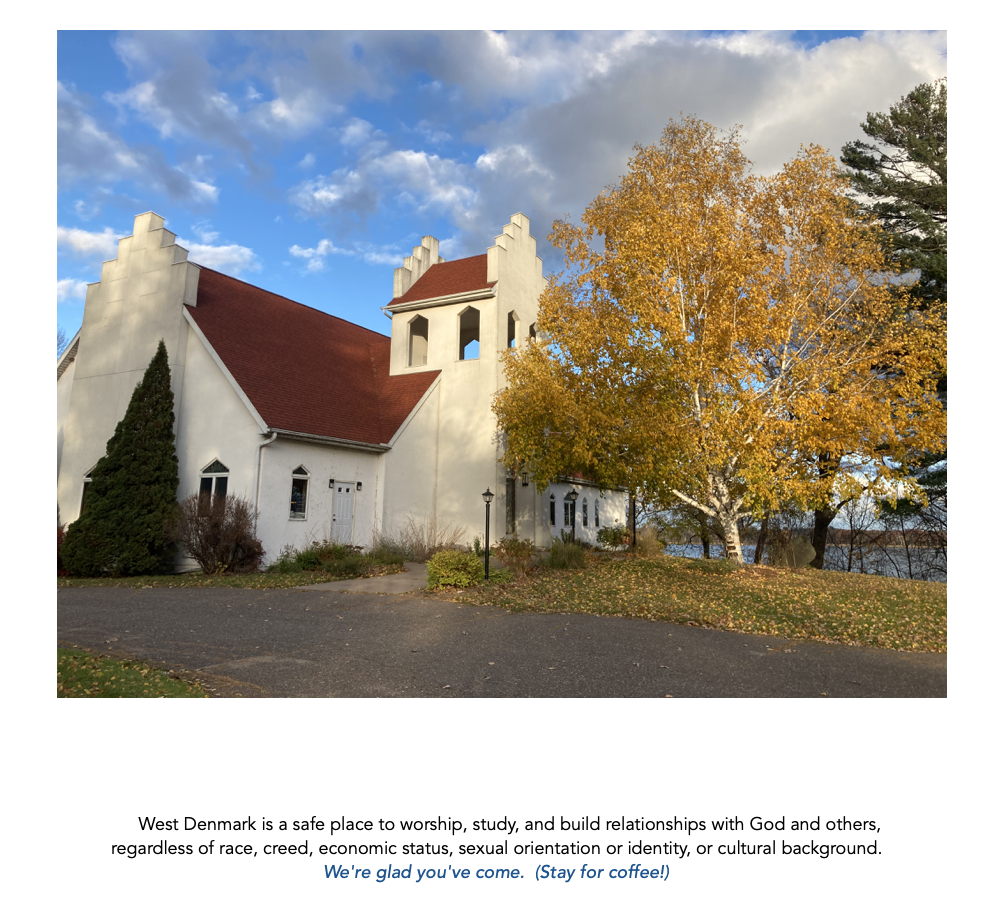
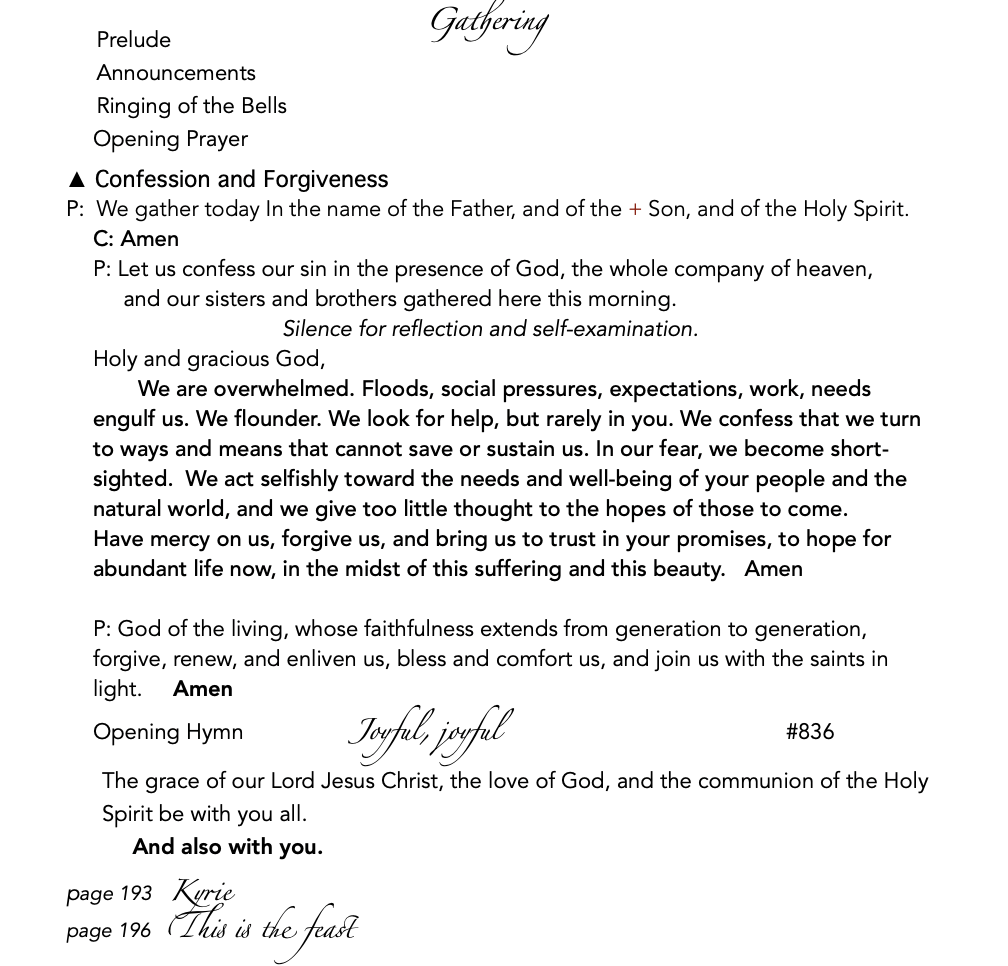
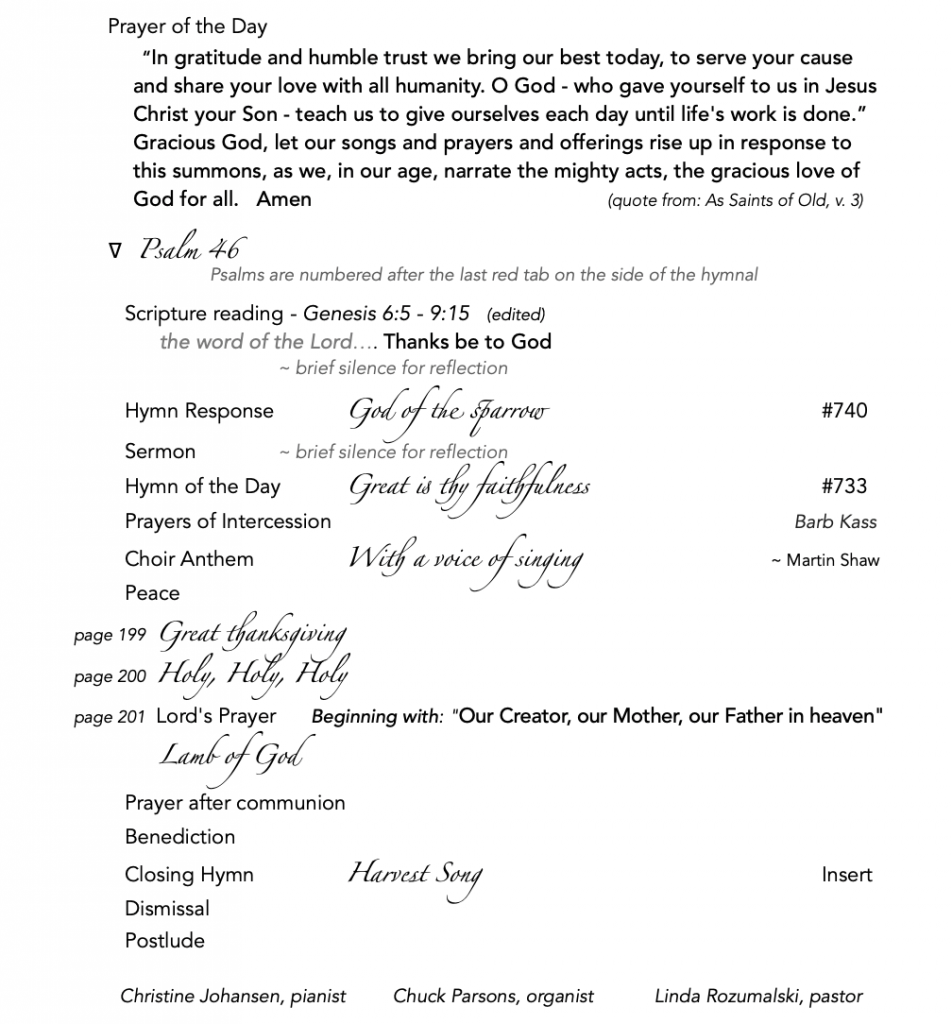
Genesis 6:5 – 9:15 edited
The earth was corrupt in God’s sight, and God saw that the earth was filled with violence, and that every inclination of the thoughts of human hearts was only evil. And the LORD was sorry that he had made humankind on the earth, and it grieved him to his heart. So the LORD said, “I will blot out from the earth the human beings I have created — people together with animals and creeping things and birds of the air, for I am sorry that I have made them.”
But Noah found favor in the sight of the LORD.
And God said to Noah, “I have determined to make an end of all flesh, for the earth is filled with violence… Make yourself an ark of cypress wood; make rooms in the ark, and cover it inside and out with pitch. Make a roof for the ark, and put the door of the ark in its side; make it with lower, second, and third decks.
“For my part, I am going to bring a flood of waters on the earth, to destroy from under heaven all flesh in which is the breath of life; everything that is on the earth shall die.
“But I will establish my covenant with you; and you shall come into the ark, you, your sons, your wife, and your sons’ wives with you. And of every living thing, of all flesh, you shall bring two of every kind into the ark, to keep them alive with you; they shall be male and female. Of the birds according to their kinds, and of the animals according to their kinds, of every creeping thing of the ground according to its kind, two of every kind shall come in to you, to keep them alive. Also take with you every kind of food that is eaten, and store it up; and it shall serve as food for you and for them.”
Noah did this; he did all that God commanded him.
[Then] the fountains of the great deep burst forth, and the windows of the heavens were opened. And rain fell on the earth forty days and forty nights. The waters swelled above the mountains, covering them. And all flesh died that moved on the earth, everything on dry land in whose nostrils was the breath of life died. He blotted out every living thing that was on the face of the ground… Only Noah was left, and those that were with him in the ark. And the waters swelled on the earth for one hundred and fifty days.
8:1 But God remembered Noah and all the wild animals and all the domestic animals that were with him in the ark. And God made a wind blow over the earth, and the waters subsided; the fountains of the deep and the windows of the heavens were closed, the rain from the heavens was restrained, and the waters gradually receded from the earth. At the end of one hundred fifty days the waters had abated; and in the seventh month, on the seventeenth day of the month, the ark came to rest on the mountains of Ararat.
Then God said to Noah, 16“Go out of the ark, you and your wife, and your sons and their wives. 17Bring out with you every living thing that is with you so that they may abound on the earth, and be fruitful and multiply.”
Then Noah built an altar to the LORD, and offered burnt offerings on the altar. 21And when the LORD smelled the pleasing odor, the LORD God said in his heart, “I will never again curse the ground because of humankind, for the inclination of the human heart is evil from youth; nor will I ever again destroy every living creature as I have done.
9:8 Then God said to Noah and his sons, “As for me, I am establishing my covenant with you and your descendants after you, and with every living creature that is with you, the birds, the domestic animals, the wild animals, and every animal of the earth with you, as many as came out of the ark. God said, “This is the sign of the covenant that I make: I have set my bow in the clouds, and it shall be a sign of the covenant. When I bring clouds over the earth and the bow is seen in the clouds, I will remember my covenant that is between me and you and every living creature of all flesh; and the waters shall never again become a flood to destroy all flesh.”
A word of the LORD our God,………. thanks be to God.
It seems amazing that we teach this story to our children. In so many ways it is a terrible tale. But, like the stories of old, it is a great and fearsome tale of mythic truths and deep meanings, and, at least in the short term, – a happy ending. It’s also interesting that we call natural calamities “acts of God” and try to purchase insurance against them. Floods, lightning strikes, straight-line winds, drought, hail, earthquakes.
I have a few little things to say about it to start with: one is a vocabulary thing.
In chapter 6 it says, “now the earth was corrupt – all flesh had corrupted itself …” and God says, “I am going to destroy all life on the earth…” The Hebrew word that is translated as corrupt is the same as for the word destroy: shachot. God says, ‘because the people shachot the earth, so I will shachot.’ In this story – and throughout the scriptures, God allows human’s own propensity for violence to come back at them. They must endure the consequences of their own action. At least through the lens of language, the punishment fits the crime. And looking at our world today – endless war, hunger, poverty, global climate change, greed, – the truth of this tough love technique seems evident.
The next thing isn’t actually a little thing at all, but the sentence is short. Chapter 8 begins, “But God remembered Noah and all the animals that were with him on the ark.”
The memory of God holds all things – divine justice requires it. All things are remembered, the kind and the cruel, the corrupt and compassionate. God’s judgment is a stern word, but ultimately a gracious word. God remembers all living creatures – those provided for by Noah through God’s instruction, and forms a covenant of grace with all of them – all life – the wild and domestic animals, the birds of the air the swarming creatures, and the humans – everything that draws the breath of air is remembered and becomes part of a new creation, receives the same promise of God’s steadfast forbearance and protection.
“Be fruitful and multiply and fill the earth.” Here, again, God repeats this instructed blessing told in those first days of creation when all things were new. But this time around, the animals are given fear and dread of human contact and humanity become hunters, no longer only vegetarians. Life after the flood is not a return to Eden, it is a new reality, a spilling over of violence, the taking of life for the sake of human appetites. And the animals are given fear as a protective defense because of us.
The third thing is the really big one. Maybe you noticed it.
Chapter 6, at the beginning of the story: “The earth was corrupt in God’s sight, and God saw that the earth was filled with violence, and that every inclination of the thoughts of human hearts was only evil. And the LORD was sorry that he had made humankind on the earth, and it grieved him to his heart.”
And then at the end of chapter 8, after the flood: 21“And when the LORD smelled the pleasing odor of Noah’s offering, the LORD said in his heart, “I will never again curse the ground because of humankind, for the inclination of the human heart is evil from youth; nor will I ever again destroy every living creature as I have done. 22As long as the earth endures, seedtime and harvest, cold and heat, summer and winter, day and night… these shall not cease.”
Noah received God’s instructions, followed them to the letter (though they were impossibly difficult), saw the task he had been appointed to – as curator of creation – through to its successful ending. He set up an altar on the newly dried ground and sent up a burned offering of thanksgiving. God smelled its aroma, was pleased by the scent and said, “the inclination of the human heart is evil from youth….”
Hmmm. God repeats the judgment of the old before the new has even begun. He chose Noah as one who was pleasing to him, and it all worked out according to plan…and still there is this connection to evil that cannot be undone, it is so much a part of us that it cannot be forgotten. Evil, too must be remembered and accounted for.
God has learned a lesson… There is change, there is a new beginning…. But it isn’t because of Noah’s goodness or righteousness or a favorable genetic disposition of the Noah clan. The change isn’t in the human heart.
The change is within God’s understanding, God’s compassion, God’s resignation. The human predicament, the human predisposition toward violence and greed cannot be separated from the human’s free will and imagination. If the human creature is to be allowed to live, created in God’s own image, endowed with some of God’s own traits, then the course is set and God must find a way forward for all life in spite of the inclination of the human toward violence and evil.
That’s a really important point of the story – and it is the good news of this dark and perilous tale. God saw the true nature and consequences of human will, and chose a course of action.
God established a covenant, a one sided promise, between herself and the wild and domestic animals and the animals that creep and swarm and the birds of the air – the living earth – and with Noah and his wife and sons and their wives and descendants forever. God promised never again to destroy the earth because of humankind’s disobedient heart and willful nature.
That road forked in a yellow woods, and God chose the path of divine grief and frustration and patience – working with and speaking through individual humans for the sake of all. The rainbow set in a stormy sky is a reminder to God of this promise. It isn’t intended as a reminder to us, but to God, that she promised to show mercy.
God is bound by this promise, bound by God’s own word and honor, and we are back to relational transcendence instead of deterministic sovereignty in case you are paying attention and remembering that discussion. God is limited now in matters relating to this human creature, in the options available for how to deal with the persistent problem of what the Bible terms sin.
We will be following this storyline for the rest of the fall in one way or another. What becomes evident – what is evident to anyone who reads history – is that we, as humankind, don’t get better. We don’t get over this problem. Goodness abounds in individuals – kindness, compassion, generosity, playfulness, joy….but we all know that we have the capacity stuffed down within us toward violence or greed or envy or arrogance or the rest of the list of 7 deadly sins. We do our best to hold them in check, keep up a public persona of control and goodness; but still, they are in there. Evil lies ready to spring, as God told Cain. We master it for the most part, but it lies in the shadow, just the same.
And so, God resigns Godself to grief on our behalf and grief for the pain we cause. The story of the flood is visually about Noah and the ark and the animals going in and coming out again two by two, but, as we keep finding, really, it is told about the character of God, the kind of God we find life in, who judges us, finds us wanting on many fronts, and finds us worthy of divine love anyway.
God determines to take suffering into his own heart and bear it there for the sake of the future of the world. The cross of Jesus is on the same trajectory of divine promise. Evil inclinations will have their day, but God has promised to work from within such a world to redeem it, not to overpower the world from on high.
It is precisely this kind of God whom we sinners have to face, and it is precisely the divine commitment to promises made that we most need to hear.
Through seedtime and harvest, winter cold and summer heat, languid days and restless nights, God remembers. God remembers. God remembers all things in the being of love.
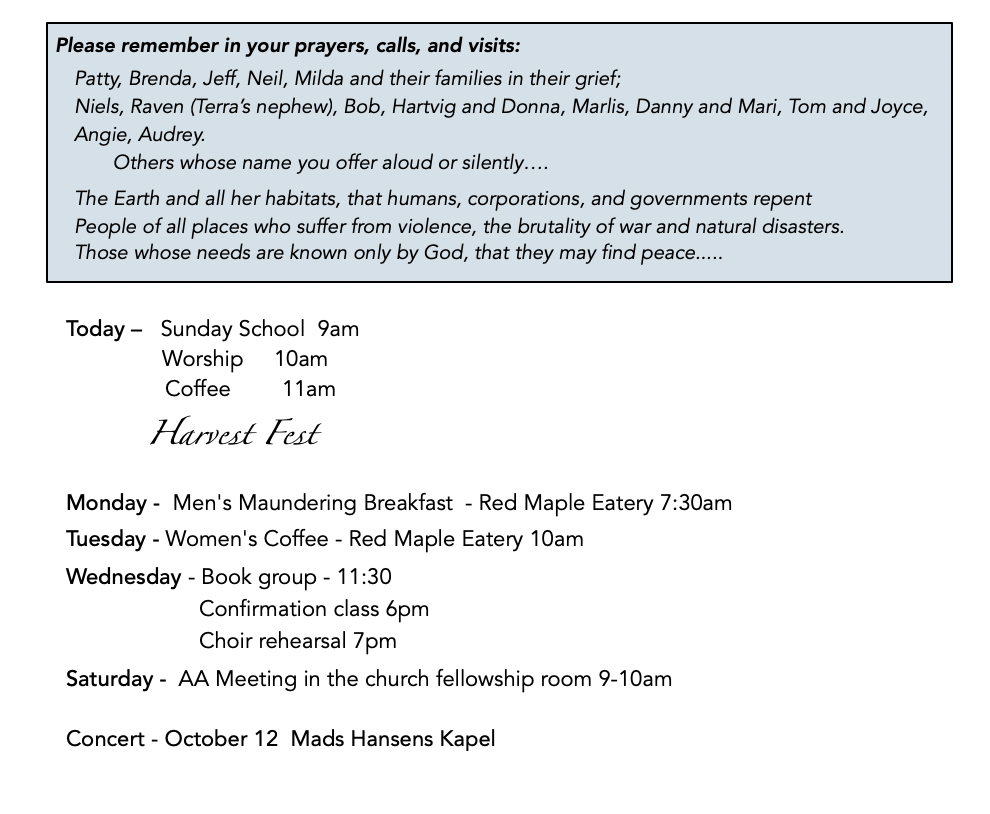
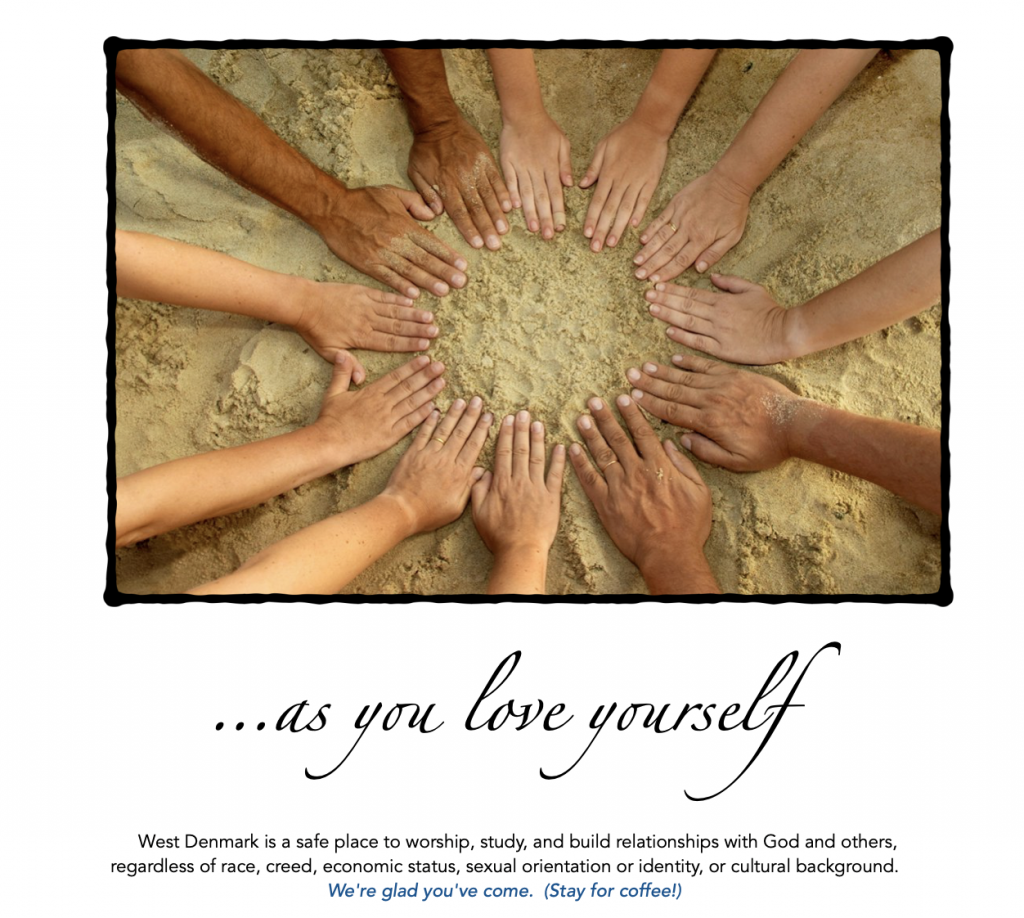
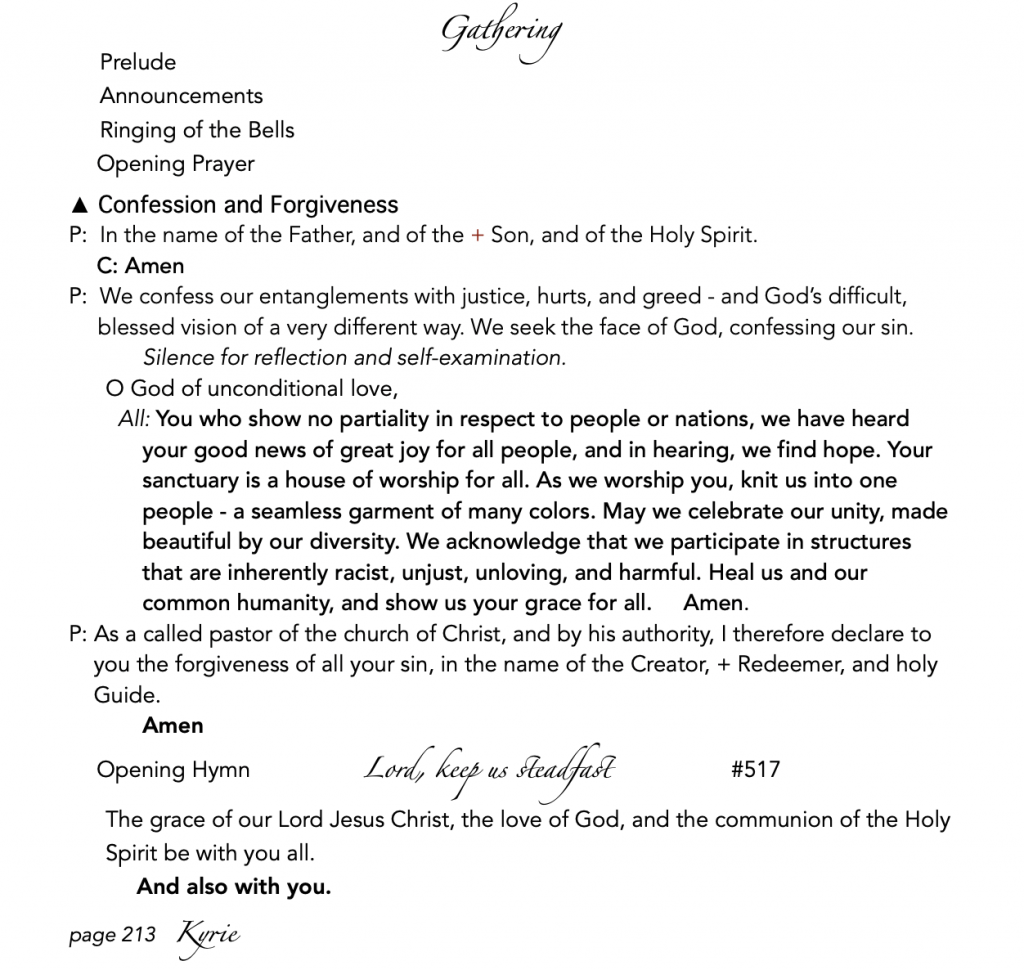
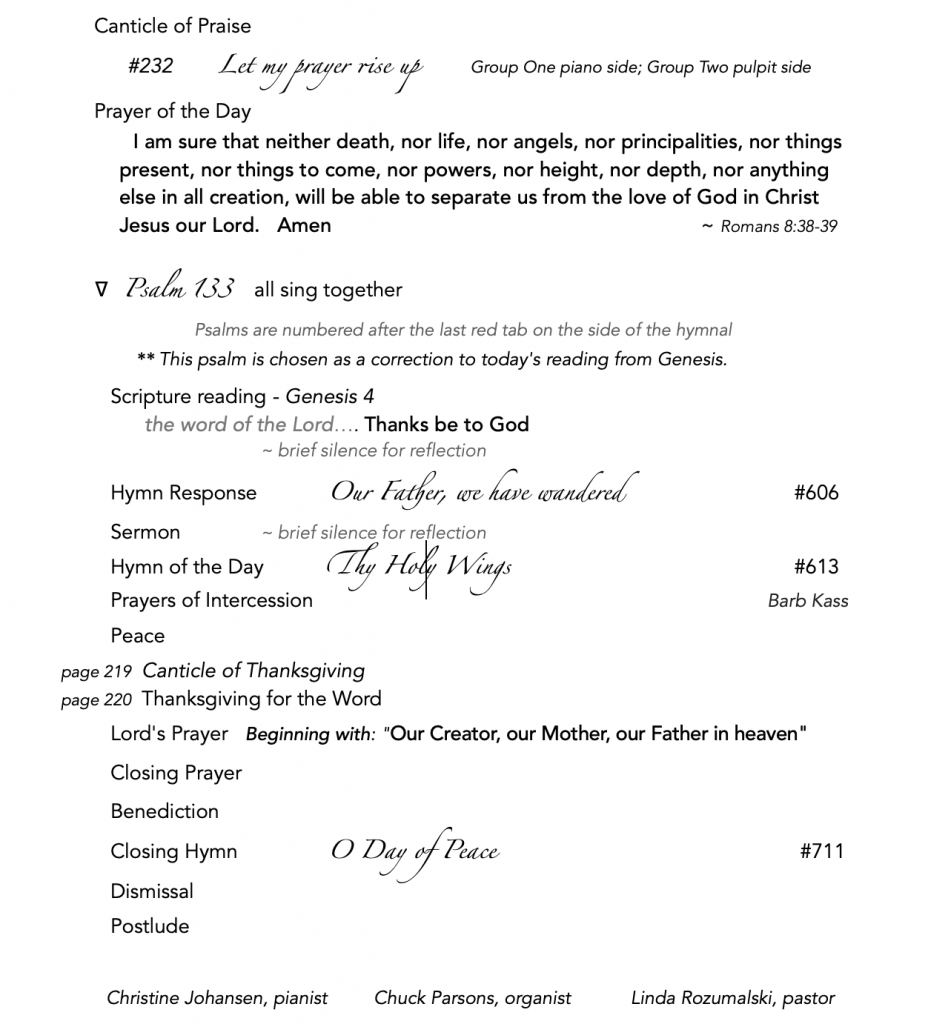
Creation begins each Narrative Lectionary year. Two weeks ago we began with Genesis, chapter 2 and life in the garden. Chapter 3 tells of Adam and Eve’s disobedience in eating the fruit from the forbidden tree in the center of the garden. It ends with this:
3:22Then the Lord God said, ‘See, the man has become like one of us, knowing good and evil; and now, he might reach out his hand and take also from the tree of life, and eat, and live for ever’— 23therefore the Lord God sent him forth from the garden of Eden, to till the ground from which he was taken. 24He drove out the man; and at the east of the garden of Eden he placed the cherubim, and a sword flaming and turning to guard the way to the tree of life.
Genesis 4
Now the man knew his wife Eve, and she conceived and bore Cain, saying, ‘I have produced a man with the help of the Lord.’ 2Next she bore his brother Abel. Now Abel was a keeper of sheep, and Cain a tiller of the ground. 3In the course of time Cain brought to the Lord an offering of the fruit of the ground, 4and Abel for his part brought of the firstlings of his flock, their fat portions. And the Lord had regard for Abel and his offering, 5but for Cain and his offering he had no regard. So Cain was very angry, and his countenance fell. 6The Lord said to Cain, ‘Why are you angry, and why has your countenance fallen? 7If you do well, will you not be accepted? And if you do not do well, sin is lurking at the door; its desire is for you, but you must master it.’
8 Cain said to his brother Abel, ‘Let us go out to the field.’ And when they were in the field, Cain rose up against his brother Abel and killed him. 9Then the Lord said to Cain, ‘Where is your brother Abel?’ He said, ‘I do not know; am I my brother’s keeper?’ 10And the Lord said, ‘What have you done? Listen; your brother’s blood is crying out to me from the ground! 11And now you are cursed from the ground, which has opened its mouth to receive your brother’s blood from your hand. 12When you till the ground, it will no longer yield to you its strength; you will be a fugitive and a wanderer on the earth.’ 13Cain said to the Lord, ‘My punishment is greater than I can bear! 14Today you have driven me away from the soil, and I shall be hidden from your face; I shall be a fugitive and a wanderer on the earth, and anyone who meets me may kill me.’ 15Then the Lord said to him, ‘Not so! Whoever kills Cain will suffer a sevenfold vengeance.’ And the Lord put a mark on Cain, so that no one who came upon him would kill him. 16Then Cain went away from the presence of the Lord, and settled in the land of Nod, east of Eden.
17 Cain knew his wife, and she conceived and bore Enoch; and he built a city, and named it Enoch after his son Enoch. 18To Enoch was born Irad; and Irad was the father of Mehujael, and Mehujael the father of Methushael, and Methushael the father of Lamech. 19Lamech took two wives; the name of one was Adah, and the name of the other Zillah. 20Adah bore Jabal; he was the ancestor of those who live in tents and have livestock. 21His brother’s name was Jubal; he was the ancestor of all those who play the lyre and pipe. 22Zillah bore Tubal-cain, who made all kinds of bronze and iron tools. The sister of Tubal-cain was Naamah.
25 Adam knew his wife again, and she bore a son and named him Seth, for she said, ‘God has appointed* for me another child instead of Abel, because Cain killed him.’ 26To Seth also a son was born, and he named him Enosh. At that time people began to invoke the name of the Lord.
The genealogy at the end of chapter 4 shows that this is also a creation story. In it we see the creation of civilization, of extended family, agriculture, arts, tools. It’s interesting that one of Cain’s descendants takes Abel’s place as the herder and shepherd. It’s also a creation story in that it plays out the genesis of sin. Just as there are two creation accounts back to back, so we are presented with two depictions of the nature and origin of sin. The first was Adam and Eve’s debacle with the fruit tree of the knowledge of good and evil. The irresistible lure of temptation seems to be mixed into the mud from which we came: Adam knew better, but sin was lurking at the door, and they ate the fruit. God both judged them for it, and provided for this couple before sending them into the world outside the garden’s hedges and guarded gate.
Cain, the first child of earth, embodies this dangerous, conflicted knowledge of good and evil. It is a conflict we are well acquainted with. Paul wrote about it in the book of Romans: 7:15″I do not understand my own actions,” he writes. “For I do not do what I want, but I do the very thing I hate. I can will what is right, but I cannot do it…. 21 So I find it to be a law that when I want to do what is good, evil lies close at hand.”
God asks Cain, “Why are you angry, and why has your countenance fallen? 7If you do well, will you not be accepted? [of course you will] And if you do not do well, sin is lurking at the door; its desire is for you, but you must master it.”
You must master it. We must learn to master exuberant puppies, classrooms of first graders and unruly middle schoolers. We must master addictions, our emotions, our desires. If we fail to master them, they will rule over us. “Sin is lurking at the door, its desire is for you.” I appreciate that sin is given this ‘poised to pounce’ quality, this sense of animation. The authors of this story were good observers of human nature.
Like his father before him, Cain had a clear choice. He, too, had a conversation with God. He, too, had time to think this over. He could have mastered his anger, his hurt, his acute disappointment. He could have asked God for an explanation for favoring sheep over grain (which we would all appreciate hearing it). He could have learned to live with his brother despite his jealousy, in spite of feeling victimized by God who – for some unknown reason – chose his brother’s offering over his own.
He could have mastered it. But he didn’t. Instead, we can picture him fuming, spiraling down into rage and justification and vengeance, violence rising. He invites Abel out into the field.
This is such an evocative story. It can take us in any number of directions. Mostly, we read it as the story of Cain and Abel.
It was deeply troubling to the ancient Israelites that those closest to us, those who should be the closest, are often the very ones who cause us the most difficulty and bring us the most pain. For the Israelites the idea of “brothers” became a shorthand way of talking about the problems we face in getting along with each other in God’s world. We are brothers, we are sisters, because we are born of the earth, born of God, born of a common humanity.
It is bad enough to live through the Eighth Day of creation (like Adam and Eve) – to wake up one day outside the garden walls, remembering and reliving the choice that alienated them from God, but it might be harder to be born East of Eden, isolated and scrounging, tilling and tending inhospitable ground, competing and envious and capable of the evil of which we now possess knowledge.
And the “troubles” arising from that knowledge are all too evident. If we are “brothers”, why can’t there be more brotherhood among us? Why can’t siblings get along with each other? Why can’t neighbors live peaceably? Friends? Strangers? Spouses? Nations? Why can’t people who are different from each other live with toleration and amicable curiosity about the other? Why do we so easily fall into hatred and violence and death? These two brothers speak for the whole of us in our disastrous interpersonal and social relationships – and tell a familiar and painful story.
One brother was a tiller of the land, the other a tender of sheep. But honestly, that doesn’t make any difference – because the story isn’t about them or their vocations… their offerings are simply the backdrop, the set up: And, actually, so is the murder.
The story is about Cain, about what lies within and must be mastered – and it’s about our fumbling efforts to understand God’s will and ways that lie beyond us, which cannot be understood, but only experienced, lived with, feared, and longed for… This creation mythic story leads us into all of that struggle. But, really, at the end of the day, I think this is the second chapter of a love story between God and her little ones.
A wild, inquisitive freedom came to life – intensely interested in others – but, in truth, only as the other relates to the self. Envy, jealousy, empathy, love, ecstasy – all the big emotions are triggered by, dependent upon, a relationship with another being. God created us as part of one another and that strife against the other and longing to be whole with the other seems to be mixed in the dust of creation.
God clothed and cared for Adam and Eve before sending them out. And in this second story, God protects and provides for Cain, the murderer of his brother. God ensures his safety, the one who took his brother’s life. God sends him away, but allows him to walk away, the one who is banished and protected. It’a a remarkable view of parental love coming from the God of all creation. I think we, naturally, look at the human side of the story. We can relate to it in so many ways – sibling rivalry, the unfair distribution of advantage, intense emotions, questioning God. We get all of that. But turning our attention to God’s action in the story is maybe more helpful. What does it teach us about mercy? About second chances? About the prerequisites necessary for God’s love? Are there any, for example?
This is the first family. They are the prototypes of humanity – and they model disobedience, pain, jealousy, rage, violence, murder, fear. We aren’t told a single word of their love or compassion or joy.
And yet God’s action is to protect and provide and open futures. That’s not the view of God we too often hear about in terms of our behavior and morality. We are told about judgment and wrath and God choosing only some for salvation. Well, here we have a primal example of God choosing, and we don’t know the why, but we hear in God’s own words that the favoring of one offering over the other had nothing to do with the favoring of one brother over the other. God loved them both, even on the backside of incredible disobedience and death, God loved Cain.
God’s initial action of choosing produces the action of the story. Because it’s not in accepting Abel’s offering, but in accepting Cain, that God’s unfathomable and loving nature is taught.
It is in providing Cain with a protective mark to shield him, in allowing him to wander away from God’s righteous presence, in providing him with life and a wife and son and future – it is in this choosing – without a word of explanation – that we see why the story was told. It’s here that the truth comes out. The good news of God’s over-riding, unexpected love and provision – for even the Cains of this world – is taught through death. This should be no surprise to us. God chooses life over judgment even for those who cannot (do not) master sin pouncing at the door, those who get yanked around on the wrong end of a leash. The next chapter is a genealogy, and when chapter six picks up the narrative, people have begun to populate the world. And this: 5 “The Lord saw that the wickedness of humankind was great in the earth, and that every inclination of the thoughts of their hearts was only evil continually. 6And the Lord was sorry that he had made humankind on the earth, and it grieved him to his heart.”
The consequences of eating forbidden fruit rippled out generation after generation spreading the hubris of thinking we are like God, when there is nothing further from the truth. And still, in spite of this continued grief, God does not change his nature or intentions for human life. There is a strange justice in this kind of love – justice even for Abel, I believe – for everyone. Actually, it is God alone who does not receive justice. She who desires intimacy with her creatures sees them wander away, turn away in disregard, generation after generation, asking for help, but too soon forgetting to love and honor and live into the sacred will.
The parable of the prodigal son, I think, completes/retells the story of Cain. He who has wandered away, finally hits bottom and realizes that he has squandered the greatest gift, and hesitantly, but resolutely, makes a return, practicing his apology, his plea for forgiveness, along the way. The father, however, sees him coming a long way off. And in a manner most undignified, runs all out, arms flung akimbo to embrace this wayward child, kisses his cheeks, puts the family ring on his son’s finger and proclaims a feast.
I realize that that is not the ending of the story we’re given, but I believe it could be. We are given the possibility to master ourselves if nothing else. And when/if we fail, to realize that we can turn, always, and return to the love of God who is ready to open a new path forward. And that might be enough.
Pastor Linda
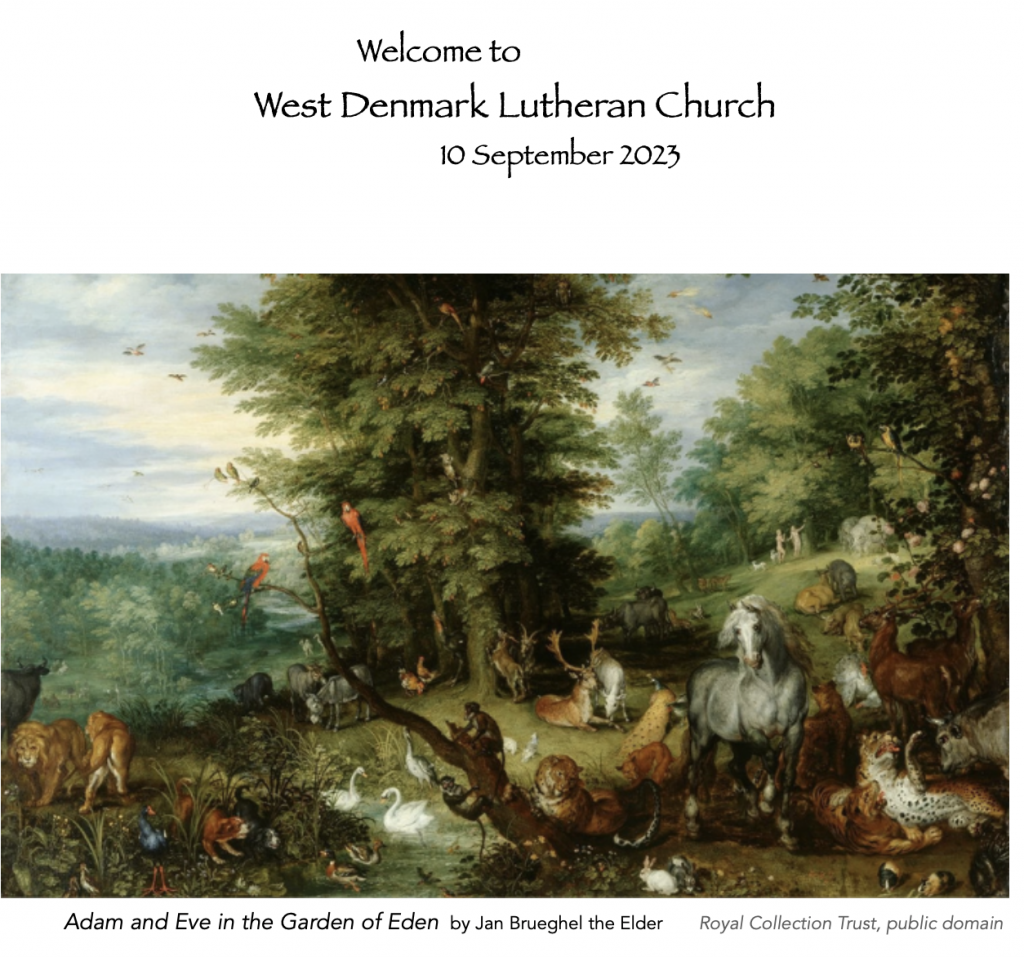
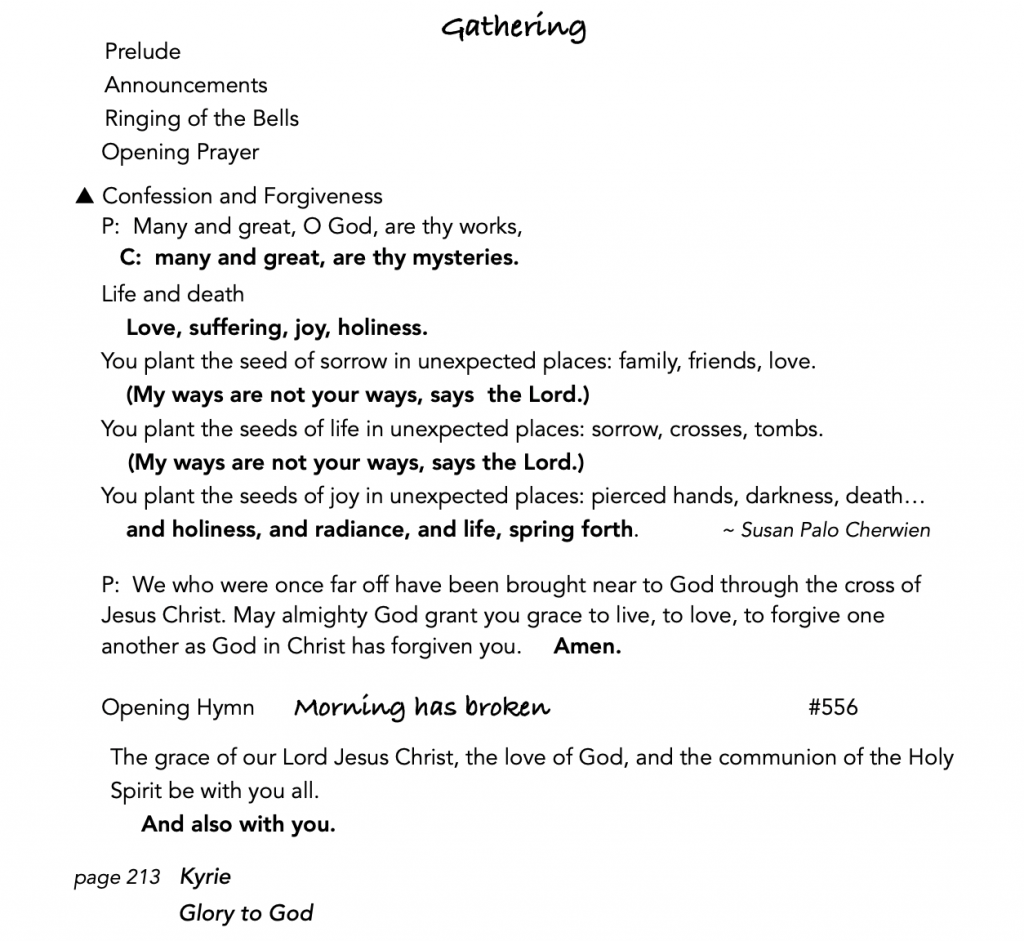
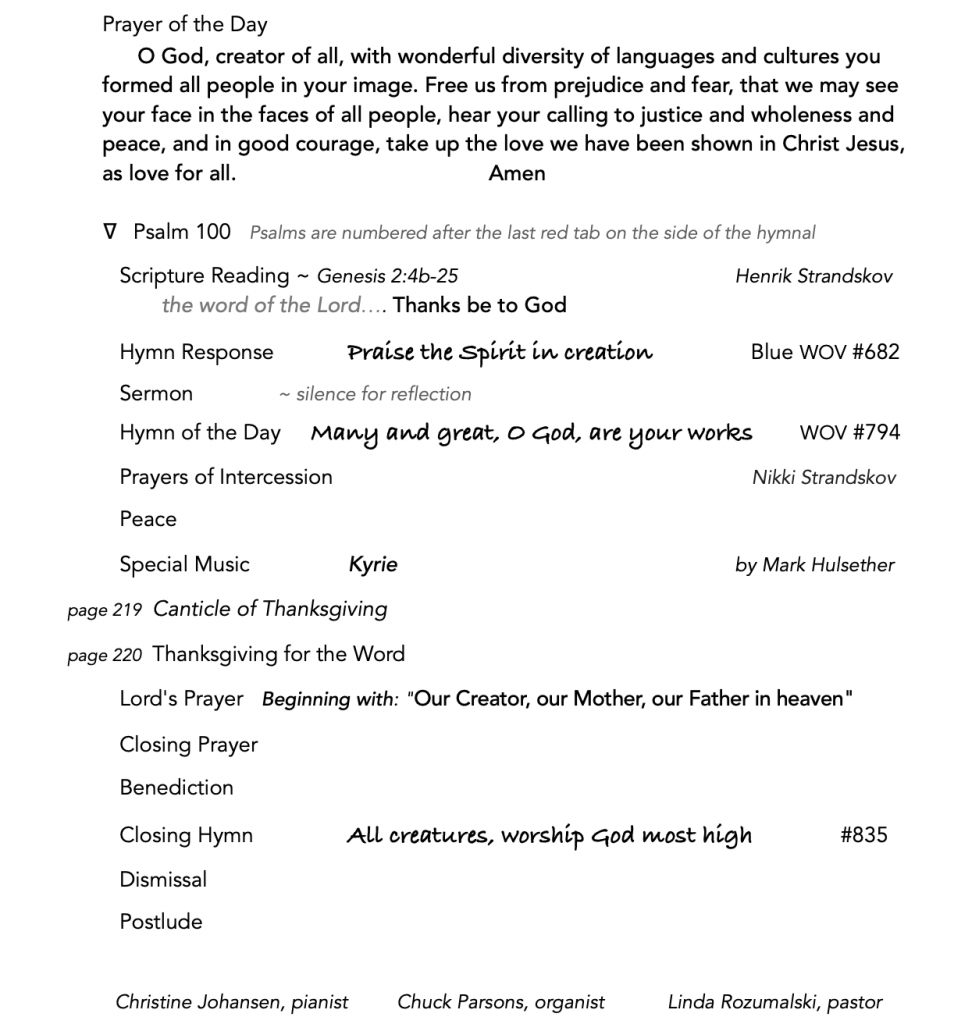
Today we begin again, in the cycle of scripture of the Narrative Lectionary. It is a four year collection of weekly readings from Genesis through the book of Acts highlighting a different gospel each year – (but not until Christmas). In these weeks of the Fall we will be in the Hebrew Scriptures that we call the Old Testament.
Today’s reading is the second of the two creation stories found in Genesis. Our challenge with familiar stories or passages is to hear what is actually said and not what we expect to hear. The two origin stories are very different and serve different functions, so, perk up your ears to hear this as if it is the only version of creation the Bible tells…
Genesis 2:4b-25
4These are the generations of the heavens and the earth when they were created. In the day that the Lord God made the earth and the heavens, 5when no plant of the field was yet in the earth and no herb of the field had yet sprung up—for the Lord God had not caused it to rain upon the earth, and there was no one to till the ground; 6but a stream would rise from the earth, and water the whole face of the ground— 7then the Lord God formed man from the dust of the ground, and breathed into his nostrils the breath of life; and the man became a living being.
8And the Lord God planted a garden in Eden, in the east; and there he put the man whom he had formed. 9Out of the ground the Lord God made to grow every tree that is pleasant to the sight and good for food, the tree of life also in the midst of the garden, and the tree of the knowledge of good and evil. 10A river flows out of Eden to water the garden, and from there it divides and becomes four branches. 11The name of the first is Pishon; it is the one that flows around the whole land of Havilah, where there is gold; 12and the gold of that land is good; bdellium and onyx stone are there. 13The name of the second river is Gihon; it is the one that flows around the whole land of Cush. 14The name of the third river is Tigris, which flows east of Assyria. And the fourth river is the Euphrates. 15The Lord God took the man and put him in the garden of Eden to till it and keep it.
16And the Lord God commanded the man, “You may freely eat of every tree of the garden; 17but of the tree of the knowledge of good and evil you shall not eat, for in the day that you eat of it you shall die.”
18Then the Lord God said, “It is not good that the man should be alone; I will make him a helper as his partner.” 19So out of the ground the Lord God formed every animal of the field and every bird of the air, and brought them to the man to see what he would call them; and whatever the man called every living creature, that was its name. 20The man gave names to all cattle, and to the birds of the air, and to every animal of the field; but for the man there was not found a helper as his partner.
21So the Lord God caused a deep sleep to fall upon the man, and he slept; then he took one of his ribs and closed up its place with flesh. 22And the rib that the Lord God had taken from the man he made into a woman and brought her to the man. 23Then the man said, “This at last is bone of my bones and flesh of my flesh; this one shall be called Woman, for out of Man this one was taken.” 24Therefore a man leaves his father and his mother and clings to his wife, and they become one flesh. 25And the man and his wife were both naked, and they were not ashamed.
The word of the Lord … thanks be to God.
You will have noticed that there are no days of creation in this version of the story. There is no orderly progression punctuated with God’s approval. The human is formed of dust (adamah, in Hebrew) and animated by God’s breath puffed into his nostrils on the same day that the earth and heavens were brought forth. The little guy was suspended in some way (I like to imagine he was put gently into God’s breast pocket) while God planted a garden in the East. East of what reference point, we might wonder, but, we are not told. From the same earth/adamah, God then fashioned trees – every tree that is pleasant to look at and good for food – and into the treeful garden the dustling, the adam, was placed. Adam and the trees, made of the same substance, preceded the plants and herbs—because the Lord God had not yet caused it to rain upon the earth, because, until Adam was made, there was no one to till the ground. So, immediately, we see that creation is meant to be intensely interactive, symbiotically mutual. God created both the human and the trees from the same adamah, breathed life into the man and, from that point on, trees and humans have been breathing together – what one exhales the other inhales (oxygen and carbon dioxide) – as though we have one lung, one breath, one life. And so we do.
The next thing to notice is that God gave the adam the task God had just completed. God created a garden and watered it, and then placed the little fellow in the garden to continue the work. God was not going to be the helper or workmate in gardening, nor was the human to be God’s little helper, but rather, God gave over the vocation of tending and tilling, entrusting the care of new creation – of plants and herbs and trees – to the brand new human being. The relationship between God and the human creature is not equal, but is, nevertheless, essential. The plants were not grown in the earth until the man was formed to tend them.
So, God watches this activity for a bit and then speaks the first word; “It is not good.”
In the first story of creative activity told in Genesis chapter 1, each of the seven days brings a new level of complexity, as it were, created through God speaking the Word, and as the sun sets on each new day, God declares, “It is good.”
That doesn’t happen in this version. That isn’t the backdrop to this story, and we must not mush the two together as though the two chapters move from cosmic scale to a close-up telling one tale. These are two unique traditions of creation told for two different reasons. I’ll get back to that in a little bit.
God watches the dustling work and says to herself, “It is not good for the man to be alone. I will make him a helpmate, a helper as his partner.” And so from the same ground, God fashions every animal of the field and bird of the air, one by one to see if it is a fit pairing. But, none is found among them. It is still “not good”.
If the ground fails to provide a suitable partner, then ‘like must come from like’. The word traditionally translated as “rib” is used in other places in scripture to mean “side” – so God takes the side of the first creation to make a pair, a match, which is why the two creatures cleave together, clinging to one another, to become, again, one flesh. The earthling, adam, made from the adamah, is now is called man, ‘ish, and his partner, made from him, is called woman, ‘ishah.
Everything about this account of creation is relational, reciprocal. That is its sense of order. Not only was the creation of the second human dependent on the body of the first, but the first human in their isolation was dependent on the creation of the second human to fill that relational void.
The next line puzzles me: 24″Therefore a man leaves his father and his mother and clings to his wife, and they become one flesh.” It is so clearly out of the storyline. Adam has no parents – other than God and mother earth – neither of whom he can, nor should, leave – and there is no mention of marriage, of the woman becoming a wife. This is a good example of biblical editing and is accepted as an awkward late arrival to the narrative imposing a later morality. It fits to some degree in that it, too, describes the move towards interdependence, a symbiotic relationship that forms in the new creation of a couple.
But, even given this awkward conclusion, the creation stories are about God, not humans. Human nature begins to heat up in the next chapter with the tree of the knowledge of good and evil. Here, it is God in the spotlight. Chapter one was written – or at least put into final form – after the Babylonian exile by what is called the Priestly tradition of redactors. It is about a sovereign God who is far above the earth’s political, human turmoil. Order and method are the world view. God, who creates space and stars and worlds with the power of a word, has chosen Israel to be the flag bearer. This view of God’s work was intended to unify and encourage the straggling, struggling people to stay in relationship with their God who is above all others, and not be seduced by the gods of Babylon. It was written, or edited, portraying the God of Israel as all powerful, all wise, the history of the world and the fates of her people all in hand. That image of God was vital for them, as it has been in various periods of time ever since for struggling, oppressed people.
Chapter two’s version that we heard today is older, told of Yahweh, the cultic, personal God of the Israelites who formed them as a people beginning with the call of Abraham, who rescued them and lead them out of slavery in Egypt personally in a cloud of fire and a cloud of smoke, who spoke to their leader, Moses, in person. This is a hands-on God who is near enough to hear, and move and comfort; to be with the chosen people. In this tradition, God works through adaptation, improvising to keep the future open.
If the whole cosmos is the scope of the first description of creation, it is the realities of the local arid earth that concern the narrator of the second story, land that needed a gardener before it could be watered, a gardener in need of a partner. And so we can see here the dual concepts of transcendent and immanent – of God over all and God within all, illustrated back to back in the first two chapters of the bible. Which should make it clear that there is not one correct way of believing or imagining God at work in our lives. There are likely infinite ways. The important part of it, to me, is to see the stories as independent and not a mash-up, in order to hear the particular truths they have to speak.
In our time and world, it is perhaps more vital to hear the second story, to hear the interrelatedness of human and earth, the breath of God in our nostrils and the breath of trees filling our lungs, of helpmates in the animal world not being soul mates, but still equal to us in creation, not hierarchically beneath us – maybe the first instance of separate but equal. It is important in our time to watch God evaluate and problem solve, to change course and keep trying to work with an increasingly strong-willed creature. It is important to hear again that creation was not made for us, for our benefit or pleasure or entertainment, but, rather, that we were created to serve. Psalm 8 claims mortals were made just a little less than divine, with all the works of God’s hands under our feet to rule and subdue them. The Yahweh writers could not agree less. If we cling to our human partners in mutual need, we must at the very least honor the life and rights of our fellow creatures, take our knee off their backs, and let them breathe.
These are the stories that lie ahead of us as we begin again in the beginning.
Pastor Linda
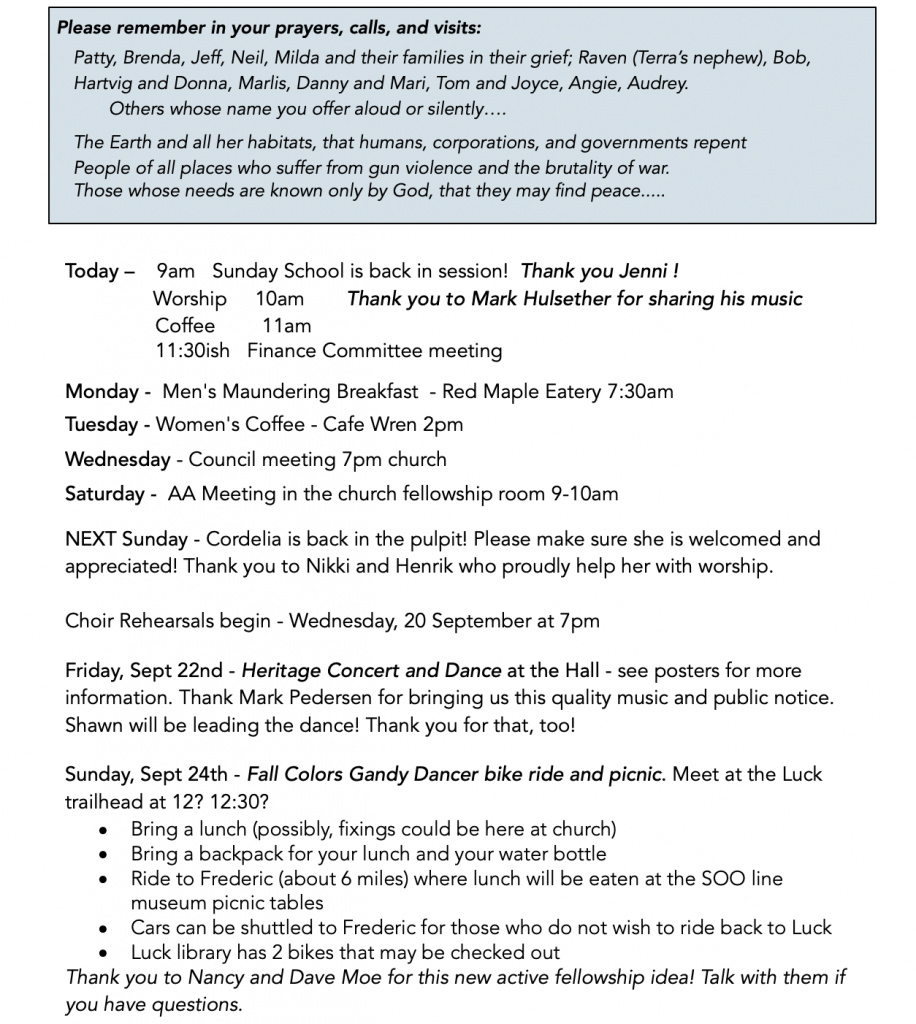
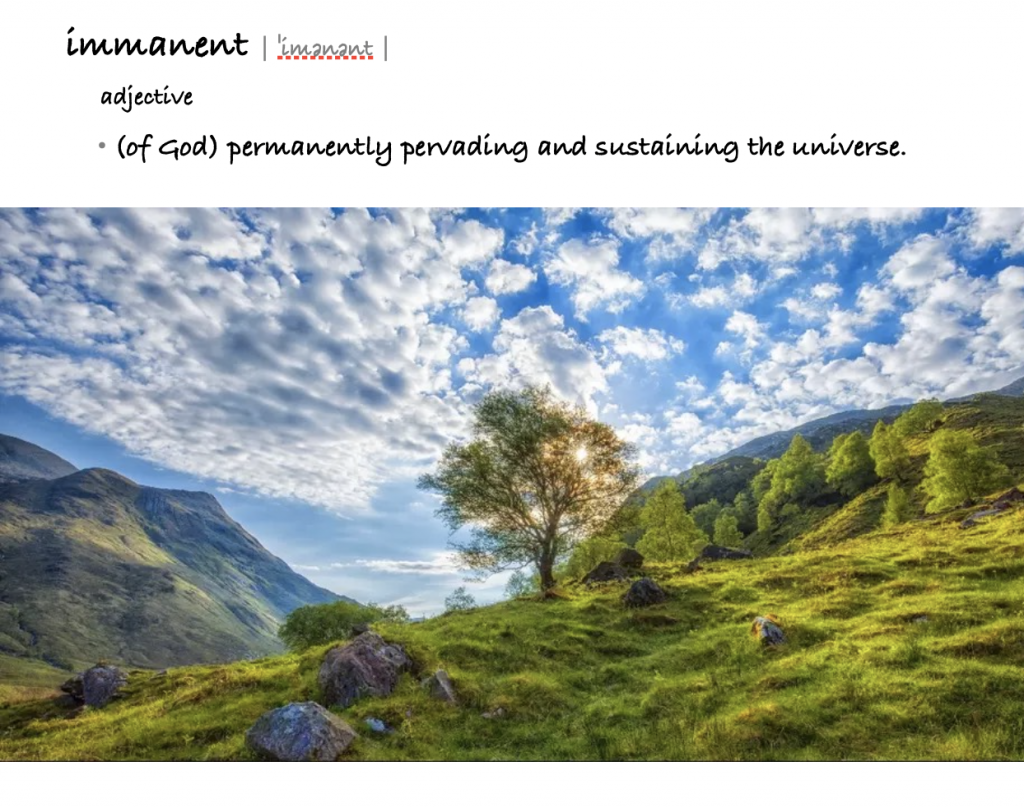
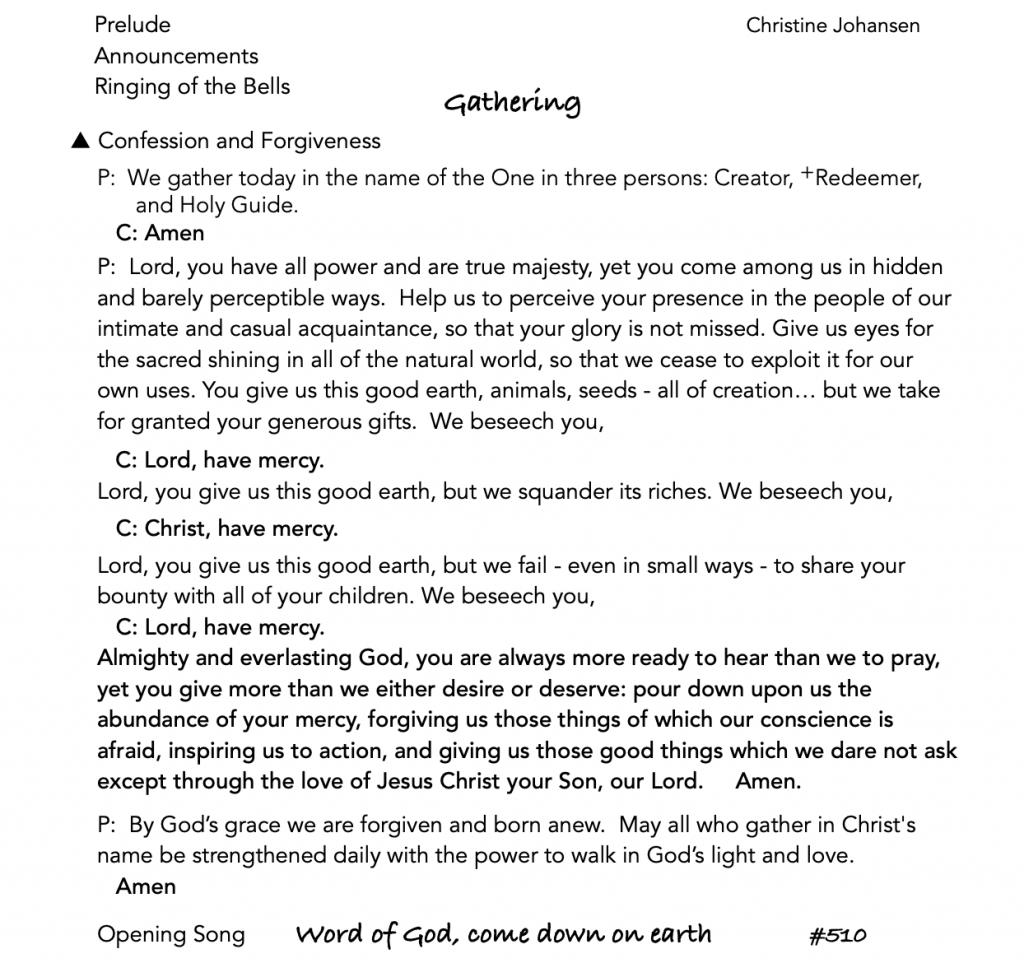
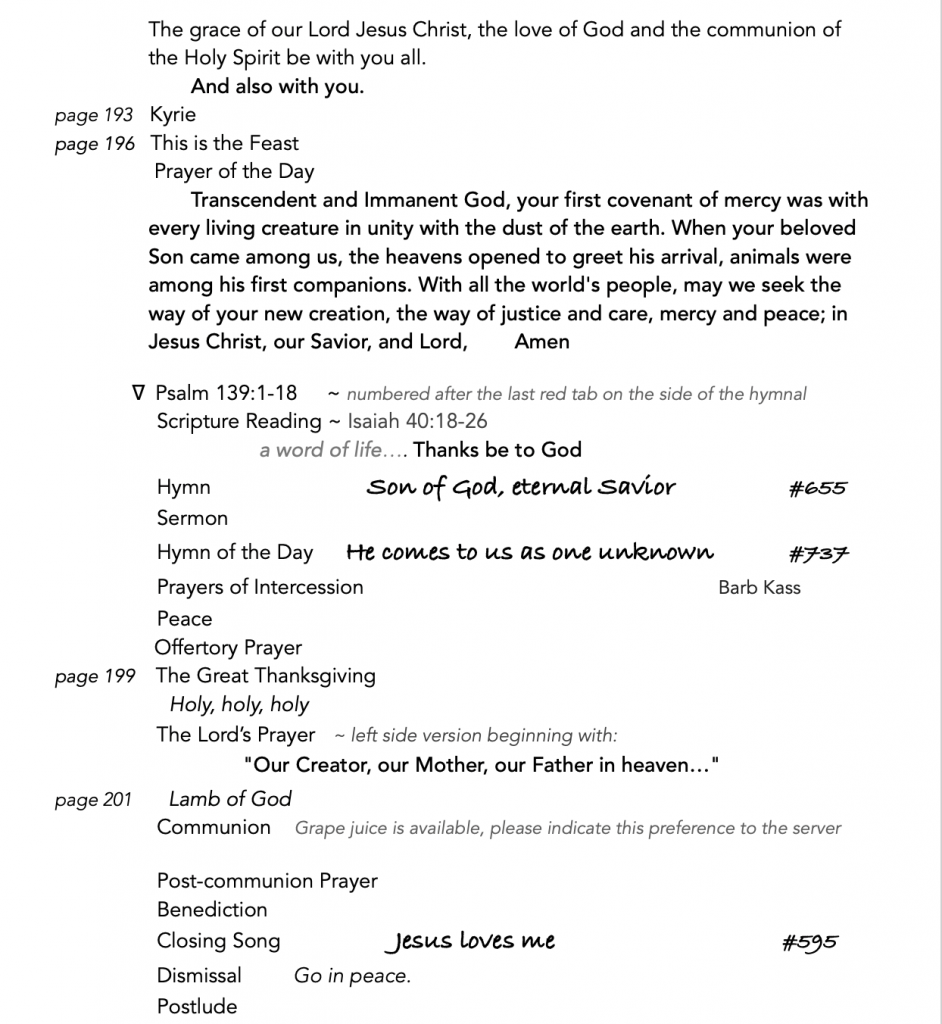
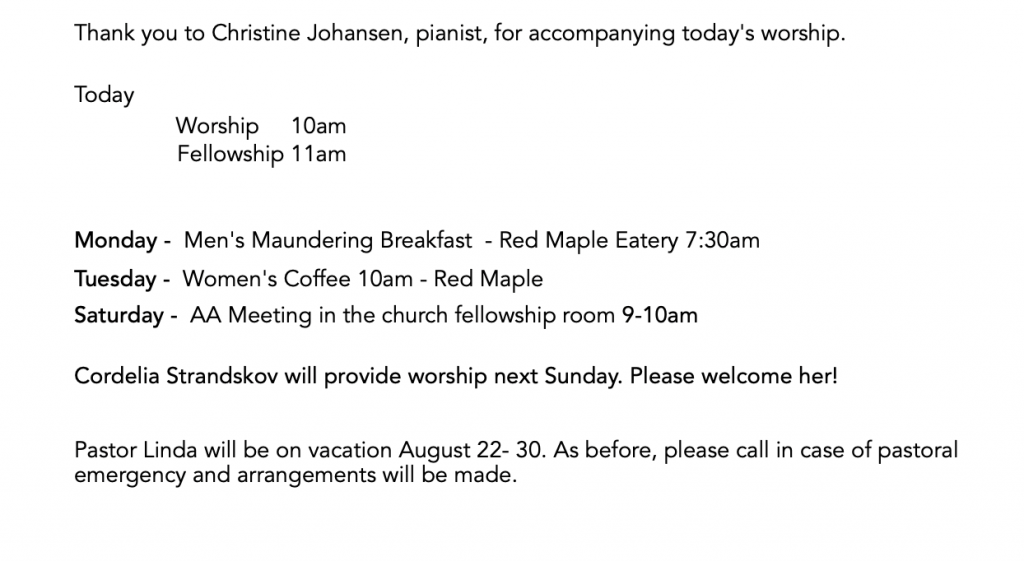
Isaiah 6:1-8
In the year that King Uzziah died, I saw the Lord sitting on a throne, high and lofty; and the hem of his robe filled the temple. 2Seraphs were in attendance above him; each had six wings: with two they covered their faces, and with two they covered their feet, and with two they flew. 3And one called to another and said:‘Holy, holy, holy is the Lord of hosts;the whole earth is full of his glory.’
4The pivots on the thresholds shook at the voices of those who called, and the house filled with smoke. 5And I said: ‘Woe is me! I am lost, for I am a man of unclean lips, and I live among a people of unclean lips; yet my eyes have seen the King, the Lord of hosts!’
6 Then one of the seraphs flew to me, holding a live coal that had been taken from the altar with a pair of tongs. 7The seraph touched my mouth with it and said: ‘Now that this has touched your lips, your guilt has departed and your sin is blotted out.’ 8Then I heard the voice of the Lord saying, ‘Whom shall I send, and who will go for us?’ And I said, ‘Here am I; send me!’
Matthew 1:18-24
18 Now the birth of Jesus the Messiah took place in this way. When his mother Mary had been engaged to Joseph, but before they lived together, she was found to be with child from the Holy Spirit. 19Her husband Joseph, being a righteous man and unwilling to expose her to public disgrace, planned to dismiss her quietly. 20But just when he had resolved to do this, an angel of the Lord appeared to him in a dream and said, ‘Joseph, son of David, do not be afraid to take Mary as your wife, for the child conceived in her is from the Holy Spirit. 21She will bear a son, and you are to name him Jesus, for he will save his people from their sins.’ 22All this took place to fulfill what had been spoken by the Lord through the prophet:
23 ‘Look, the virgin shall conceive and bear a son,
and they shall name him Emmanuel’,
which means, ‘God is with us.’ 24When Joseph awoke from sleep, he did as the angel of the Lord commanded him.
Colossians 1:15-20
15 Christ is the image of the invisible God, the firstborn of all creation; 16for in him all things in heaven and on earth were created, things visible and invisible, whether thrones or dominions or rulers or powers—all things have been created through him and for him. 17He himself is before all things, and in him all things hold together. 18He is the head of the body, the church; he is the beginning, the firstborn from the dead, so that he might come to have first place in everything. 19For in him all the fullness of God was pleased to dwell, 20and through him God was pleased to reconcile to himself all things, whether on earth or in heaven, by making peace through the blood of his cross.
The word of the Lord….thanks be to God
In looking at the big categories of the nature of God, this week we get up close and personal.
Immanence means existing or operating within.
Sovereignty, as I talked about it two weeks ago, sees God outside of us – beyond the Milky Way – and so ‘other’ than us, “God is God and you are not,” that there is almost no connection. We are mere mortals in a vast cosmos, playing our appointed, predestined roles, and the rolling on of ages and eons makes us, individually, very nearly nothing, and, collectively, a self-centered, invasive species. And in the grand scheme of things, that’s about right. The sticking point for Lutherans (and many others), is the Calvinist accompanying belief that God has chosen only some for salvation and predestined, and preordained exactly what will happen in minute detail for all of time. Everything happens according to God’s will and nothing happens that isn’t by God’s will. Ours is to live and die in hope – and in awe at the power and incredible works of God.
Last week I brought in a less Calvinistic view of Sovereignty in Relational Transcendence. Yes, God is God, but the Almighty longs to be in relationship with us, not apart and deterministic, but in genuine covenant of mutual promises and attentiveness.
God is all-powerful in God’s own being, but has chosen to limit that power to enable natural laws, human nature, and free will to have actual agency. In effect, God has shared power with his creation. What we do matters, and it matters to God. This is a God of continual creation, adaptation; accepting or tolerating or grieving human will and ways, and responding to it so as to keep a future opening in front of us toward redemption. God, in majesty and glory, beyond time and spatial conception, does not “lord it over us” or ignore us, but honors the creature, and hopes for what God does not demand – creaturely recognition and honor of the divine being. All people are destined for salvation, although the details are not known or knowable.
This week we hang onto transcendence but move inward. Immanence is the word of the week. It means existing or operating within.
When it is used to describe the nature of God, immanence means God is “permanently pervading and sustaining the universe”. That definition comes from my computer’s New Oxford dictionary. I especially like the ‘permanently pervading’ part of that. Pervading is such a cool word to use of God. Kind of a stealthy invasion. Seeping in – into thoughts and visions and dreams and conversations and cracks in the armor of our rational awake, aware selves… spreading through, potentially, able to be perceived in every part of creation, including human beings – every one of us.
Permanently pervading. God has always been this way according to the biblical witness. We tend to think of the incarnation and Jesus when we hear “God with us” – and I’m going to just about ignore that today, because it is the nature of God we’re looking at, not simply the second person of the trinity. God has been coming near since the moment of creation.
Think of all the biblical accounts of barren women being promised a child. That is an incredibly intimate, relational concern for the Creator of the cosmos to zero in on – a certain couple in the ancient world who would pay attention to the promise because it lies outside of their own ability to replicate. They couldn’t conceive in the usual way of things, but a promise is made and a child is conceived. And that child will go on to play a role in the salvation narrative of an entire people. Sara bore Issac, Rebekah bore Esau and Jacob, Rachel bore Joseph, Hannah bore Samuel, the barren (and anonymous) wife of Manoah bore Samson, Elizabeth bore John the Baptist. And in each case, history changed course. That’s sneaky. And then there’s Mary…
The opening of closed wombs is the quintessential example of a transcendent and immanent God. The unique creative attributes of the Lord of All Existence intervening in a particular couple’s intimate life.
The transcendent God is awesome as a mountaintop experience, but in our need, it is the personal God, a relational, noticing, immanent God that we crave.
We love the Christmas story, because it brings God close. It brings the God of Isaiah’s throne room vision with soaring cherubim and seraphs into a manger with the smell of hay and straw and animals. God comes into Mary and Joseph’s arms for snuggles. But Mary was warned that a sword would pierce her heart, too. We should be warned away from the full blast of God’s presence. Let’s go back to the list of God midwifed sons:
Isaac is bound on the altar to be sacrificed, Jacob flees for his life from his murderous brother and wrestles with a divine being on his return, before facing Esau again. Joseph is nearly killed by his brothers and then sold into slavery; Samson is dedicated as a Nazirite to God, which gives him the strength (through his uncut hair) to wage a one-man battle against the Philistines, but ultimately dies a martyr’s death in the Temple of Dagon; Samuel is given, as a very young boy, to serve God in the sanctuary at Shiloh; John the Baptist loses his head, and Jesus dies on a cross. These narratives suggest that God, who opens the womb, sets a claim on the life that emerges from it. The purpose wasn’t for a happy ending. It was for salvation’s work to move forward.
Very few of the stories we have from the bible have satisfying endings. Being close to God isn’t a success story in terms of the life we want to live. Think of Job and Jonah, or the disciples for that matter. We don’t hear of any of them going home and having grandchildren and a nice retirement.
Experiencing the direct presence of God is dangerous business. So, there must be varying degrees of proximity. Or maybe that is what “many are called but few are chosen” means. We are claimed and noticed, but most are not necessarily needed for the more dangerous forms of divine work in the world. We are on call. We are called to be the voice and face and hands and feet of God’s saving love in the small ways of everyday life and encounter.
Immanence, with it’s perpetual persistent pervading is an interesting concept in the nature of God.
On the one hand, if God is in everything, then everything is imbued with some sparkle of God’s glory. Everything and everyone bears something of God.
On the other hand, if God is in everything, it means we are disregarding the holiness, the sacred potential of almost everything.
The land is not God, but God is in the soil, and grass and plant life. There is something sacred in hummingbirds and earthworms. Water is not God, but God is water. We are not God, but God is permanently pervading us, everyone, everywhere.
It’s a startling proposition. Indigenous religion is much better at honoring the Creator than we, whose religion has perhaps become too institutionalized and removed from its roots in the earth.
We’ve gotten spiritually lazy in our relatively comfortable life. God is either ‘out there somewhere being God’ or nearby in a cozy, comforting kind of way. But the Bible doesn’t agree with either of those notions. Immanence is a companion to transcendence, not a substitution. It’s not one or the other. God is sovereign over everything, and if God is truly with us, in and through us and all things, the very least we should be doing is paying better attention.
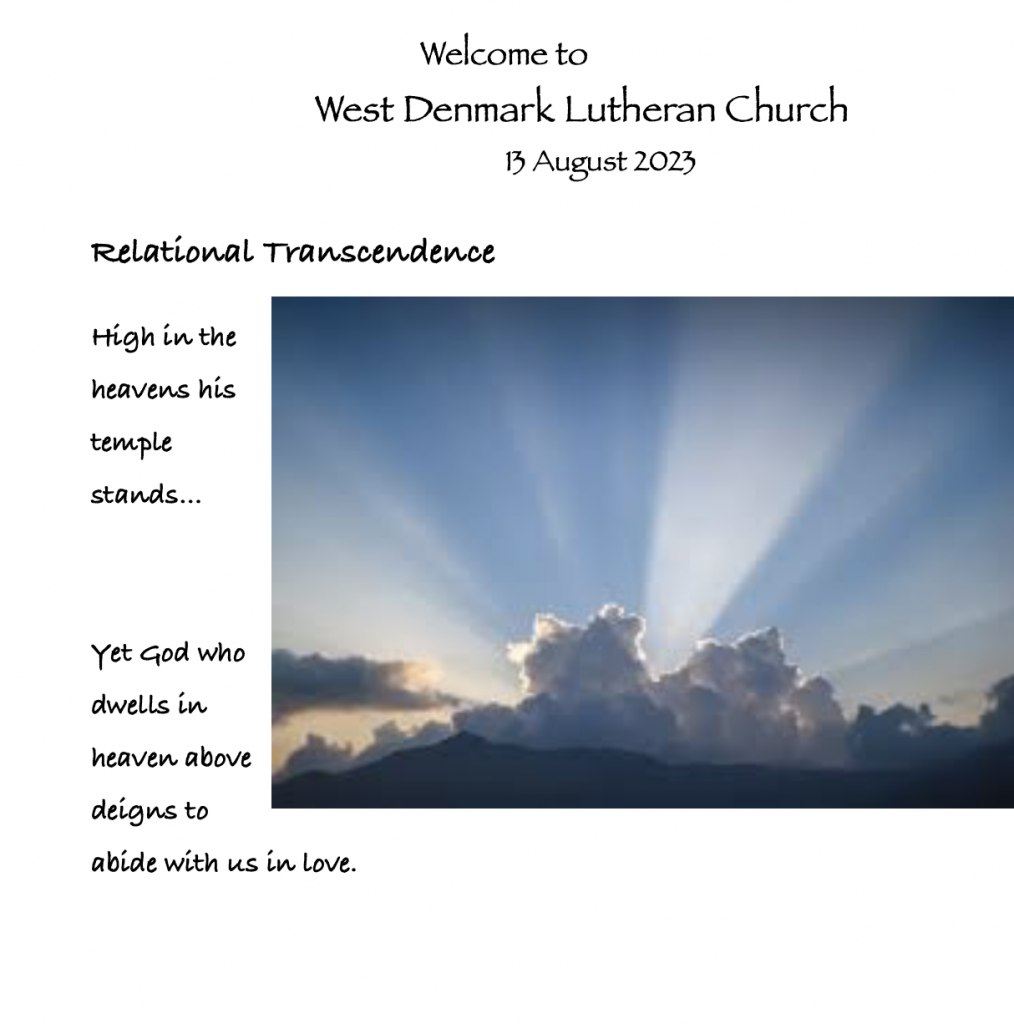
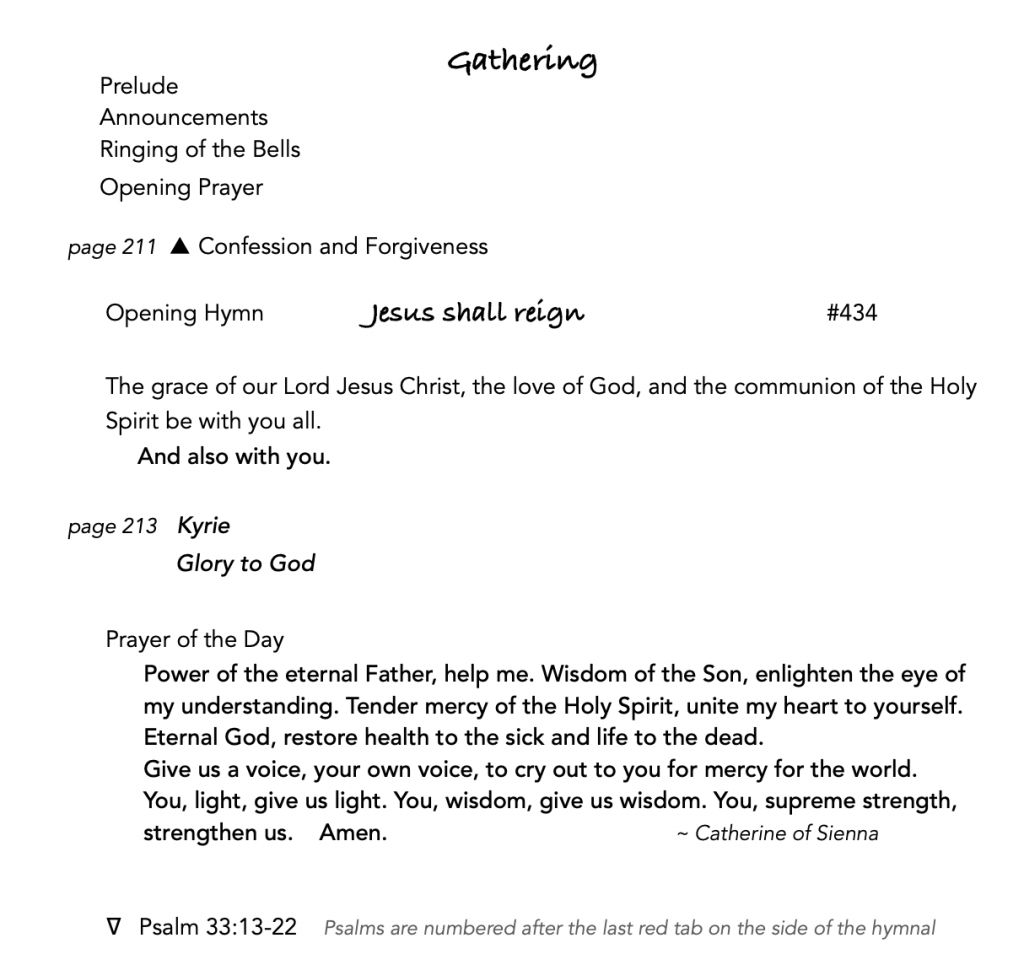
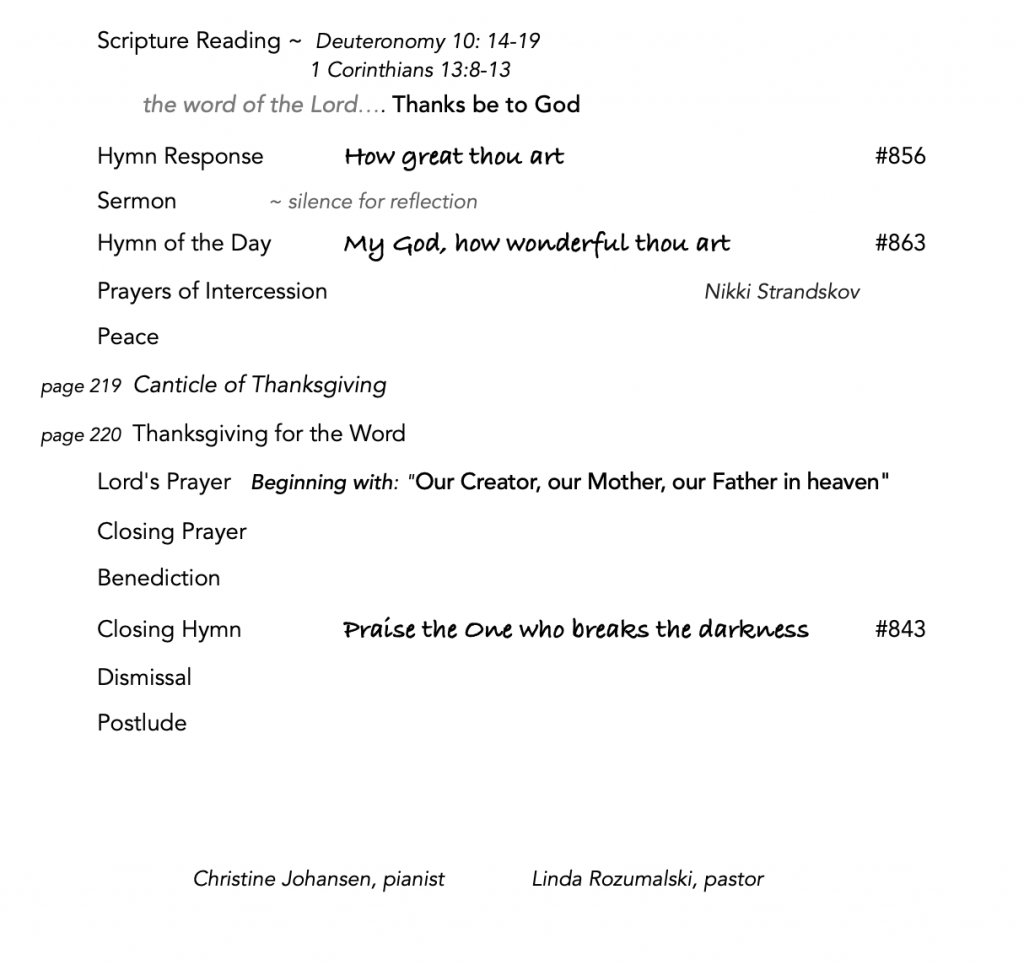
Deuteronomy 10:14
“Although heaven and the heaven of heavens belong to the Lord your God, the earth with all that is in it, 15yet the Lord set his heart in love on your ancestors and chose you, their descendants after them, out of all the peoples, as it is today. 16Circumcise, then, the foreskin of your heart, and do not be stubborn any longer. 17For the Lord your God is God of gods and Lord of lords, the great God, mighty and awesome, who is not partial and takes no bribe, 18who executes justice for the orphan and the widow, and who loves the strangers, providing them with food and clothing. 19You shall also love the stranger, for you were strangers in the land of Egypt.”
1 Corinthians 13:8
“Love never ends. But as for prophecies, they will come to an end; as for tongues, they will cease; as for knowledge, it will come to an end. 9For we know only in part, and we prophesy only in part; 10but when the complete comes, the partial will come to an end. 11When I was a child, I spoke like a child, I thought like a child, I reasoned like a child; when I became an adult, I put an end to childish ways. 12For now we see in a mirror, dimly, but then we will see face to face. Now I know only in part; then I will know fully, even as I have been fully known. 13And now faith, hope, and love abide, these three; and the greatest of these is love.”
As a reminder, last Sunday we took a look at the nature of God and the way God is in the world through the lens of sovereignty – and, mostly, through the Calvinist view of sovereignty because that is what is out and about in modern American religious talk – it’s what makes the news, it’s what we see in social media postings, it was the dominant religion that formed our nation and that influences it greatly still today.
White Nationalist Christianity thrives in the Calvinist setting. Why? Because a deterministic God is all-powerful, has known everything that was, is, and ever will be – in fact, God has preordained and predestined the path of all things according to divine purposes from before the beginning of the world. God’s wisdom is unsearchable. Everything we experience, think and do is God’s will – according to that tradition.
Therefore, the way things are, the status quo, was put in place through God’s will. And, therefore, any dissatisfaction with the status quo, any attempt to change it is against God’s will and is inherently evil: the status quo – where power is in the hands of white male Christians. American Christianity has become a fear-based, judgmental, exclusionary religious culture. Christ and Christ alone. Believe or be damned. Believe in what we believe, or be damned. The faithful of every other religion are damned. Heaven will just be Christians… who believe in like-minded ways.
I don’t believe what they believe. And neither do a whole passel of religious folks who do believe in God, in Jesus Christ, and in the Holy Spirit. So, what are our options regarding the sovereignty of God?
Well, they are life affirming and bold and biblically true!
Before I get into it, I do want to remind you that whatever you, I, or “they” believe about God is, as the apostle Paul pointed out, “seen through a glass darkly“. It’s all human grasping after understanding of something that we can understand only dimly, on the slant, out of the corner of your mind’s eye. We DO NOT KNOW anything about God. No one does. We aspire to know God through faith, through scripture, through sacraments, through prayer. We experience God through the Spirit’s urging or quickening, or insight in our inner, private lives. We teach and learn and inherit a religious and faith tradition in church. We wiggle it all around until it fits our particular personalities and needs. We change our beliefs over a lifetime of struggle and joy. This is natural and necessary. Again to quote Paul, “When I was a child I spoke like a child, I thought like a child, I reasoned like a child; when I became an adult, I put an end to childish ways… Now I know only in part; [but in the fullness of time,] I will know fully, even as I have been fully known.” We aren’t there yet.
Again, my point in this sermon series is to look at the big picture of how we think about God, ourselves and the world. Looking at God is called theology (the study of God); looking at ourselves is called anthropology (the study of human beings and cultures); looking at the world is ecology (the study of the eco systems that sustain all life). So, it is important! I think. And it is a faithful, faith-filled thing for each of us to spend time with in our own ways. This is my way and I have the microphone, but it is NOT the only faithful or true way. I hope it is both of those things, but in truth, I don’t know. As always, I’m interested in your thoughts.
So, on we go to an alternative view of sovereignty.
Terry Fretheim was the top of my three favorite professors at seminary. He taught Old Testament classes, wrote a bunch of textbooks on my shelves, and came here to West Denmark to preach for my ordination. He died a couple of years ago. He taught Old Testament through a relational view of God’s sovereignty because he believed God genuinely is in relationship to the earth and her creatures, and a genuine relationship requires give and take, mutuality, adaptability, the potential and expectation of transformation and change and growth. He taught God as the personal, loving, self-involving, passionate, relational Yahweh of Israel and Father of Jesus Christ, who became vulnerable in relation to the world through the covenantal relationships with the Israelites and, by extension, with all people.
Walter Brueggemann is another, perhaps better known, Old Testament professor and author. (Terry said Walter didn’t have a stray thought he didn’t publish! So there was a bit of professional competitive conversation between them.) As a memorial work after Terry’s death, Brueggemann wrote an essay on the theological differences between them which mostly had to do with sovereignty. I’m going to read a bit of what he wrote.
“Overtime, enough difference between us emerged to evoke an ongoing conversation about the ways in which the Old Testament is witness to the action of God in the world. Through his focus on creation themes, Terry drew the conclusion that God’s work in the world was a part of an ongoing process. He judged that in the governance of history, God’s action was characteristically in and through historical agents, and not directly. My attention was especially drawn to the narratives of Old Testament wherein God is portrayed as being the help of the helpless when “other helpers fail and comforts flee.” There, as in the Exodus narrative, God is seeming to act through direct agency. Terry’s judgment was that I have been excessively influenced by the “strong God” of John Calvin.”
This relational, transcendent theology is what makes sense to me. God is in a genuine relationship with us and the world and therefore is always adapting to the actions of humans. You can certainly see it in the story of Israel in the Biblical accounts where God’s chosen people had real choices to make. God led them and fed them coming out of Egypt, counseled and guided them through Moses, spoke to and warned them through the prophets, and, according to their own telling of it, acted on them, against them, through their enemies when they didn’t listen or act faithfully to his word. And when God came to humanity as one of us to show us what that Word was saying, what faithfulness to the Word looked like, God’s full relational vulnerability is on display. After Jesus was killed by his own people, God showed what sovereign love looks like by overcoming even death and promising that same act of powerful love for all who hear and trust his word. Jesus sent the Holy Spirit to be the continuance, the whisperer of God in our spirit’s ear. All of these avenues of God’s action are relational, dependent to varying degrees on our response. We can wear earplugs and turn away. We can follow to the best of our ability. We have real choices in how we behave and believe. Because God is faithful, God will work in relation to whatever response is given in order to keep opening up the future.
In relational sovereignty, the future is known to God, but unwritten. The end is known, but the way toward it is not predestined. What humans do makes a difference to God.
It’s like the GPS in google maps. If I type in my bother’s address in Detroit Lakes, two or three possible routes will appear between my present location and Dave’s house. I choose one and begin. But, if I miss an exit, or the road is detoured, the map kind of spins around for a bit while it recalculates, and a new blue path appears. It has adapted to my altered circumstances. I’m still going to get to Dave’s house, but the roads have changed. New options open in light of present circumstances. I believe God works that way in human history, working with and through whatever agents are available to create the best outcome given the choices that are available.
In relational theology, God honors the rules of nature established with creation. In that way God is self-limiting in power. Evil exists because people act in ways contrary to God’s will. Illness, hurricanes, wildfires, wars exist not to fulfill God’s purposes, but because that is the nature of life on our planet. Miracles do happen, help comes from unexpected quarters, there is a mysterious way of God woven through our lives like radio waves looking for transmitters. But the choices we make are real, and meaningful, and have consequences not only for us and on our neighbors and future generations, but for God in relationship with us and in action in the world.
Another article I read this week was by Roger E. Olson who says God is sovereign over God’s own sovereignty. I like that. He writes: “To say that God can’t be vulnerable, can’t limit himself, can’t restrain his power to make room for other powers, is, ironically, to deny God’s sovereign power. That is what’s missing from a Calvinistic determined view of sovereignty. If we believe that God has locked in the future, knows exactly what’s going to happen, then not only is God responsible for things like the Holocaust and Hurricane Katrina and every horror we inflict, but God is limited by the future. And an all-powerful God, by definition, can’t be limited or stymied.”
“It also undermines participation in the mission of God'” he says, “because it makes our participation with God superfluous. We are seen as pawns rather than knights.”*
A transcendent understanding of God claims that God is immortal, invisible, all-powerful, holy, and wholly other, but is, by God’s desire and design connected, vulnerable, affected by, and responsive to the creatures and creation of God’s making, the works of God’s fingers, in genuine ways. And in that relationship, by the power of God’s faithfulness, trustworthiness, and steadfast love – the future is open, and the ending is sure.
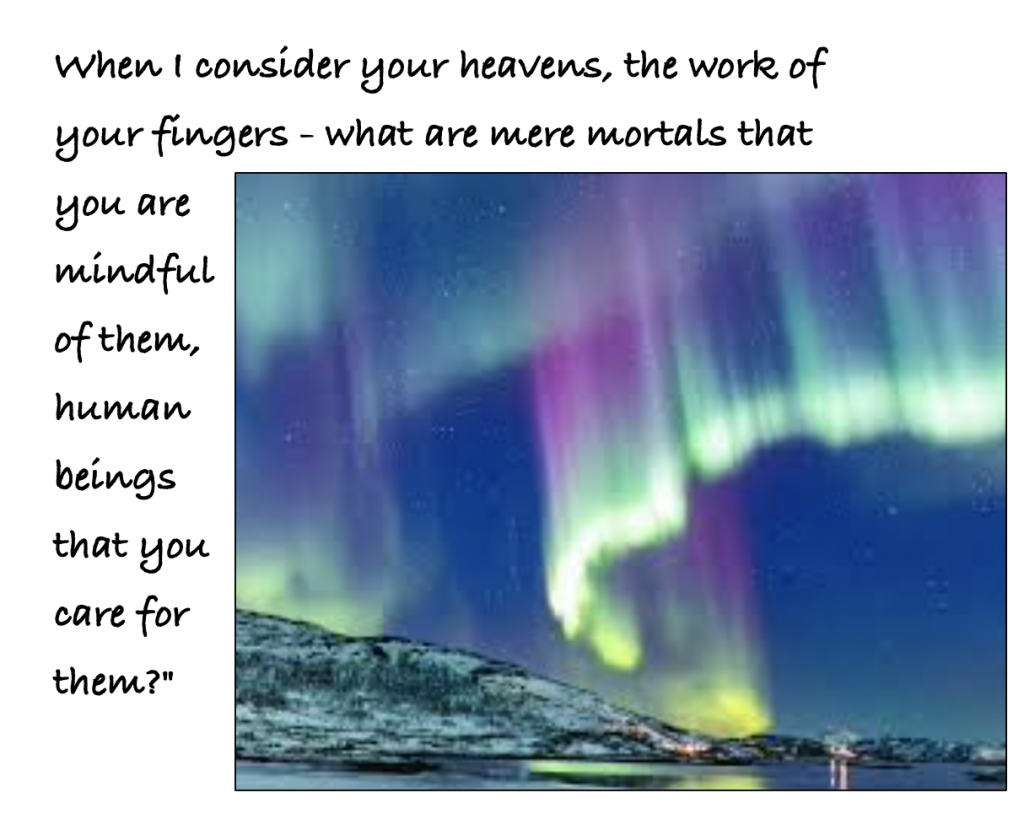
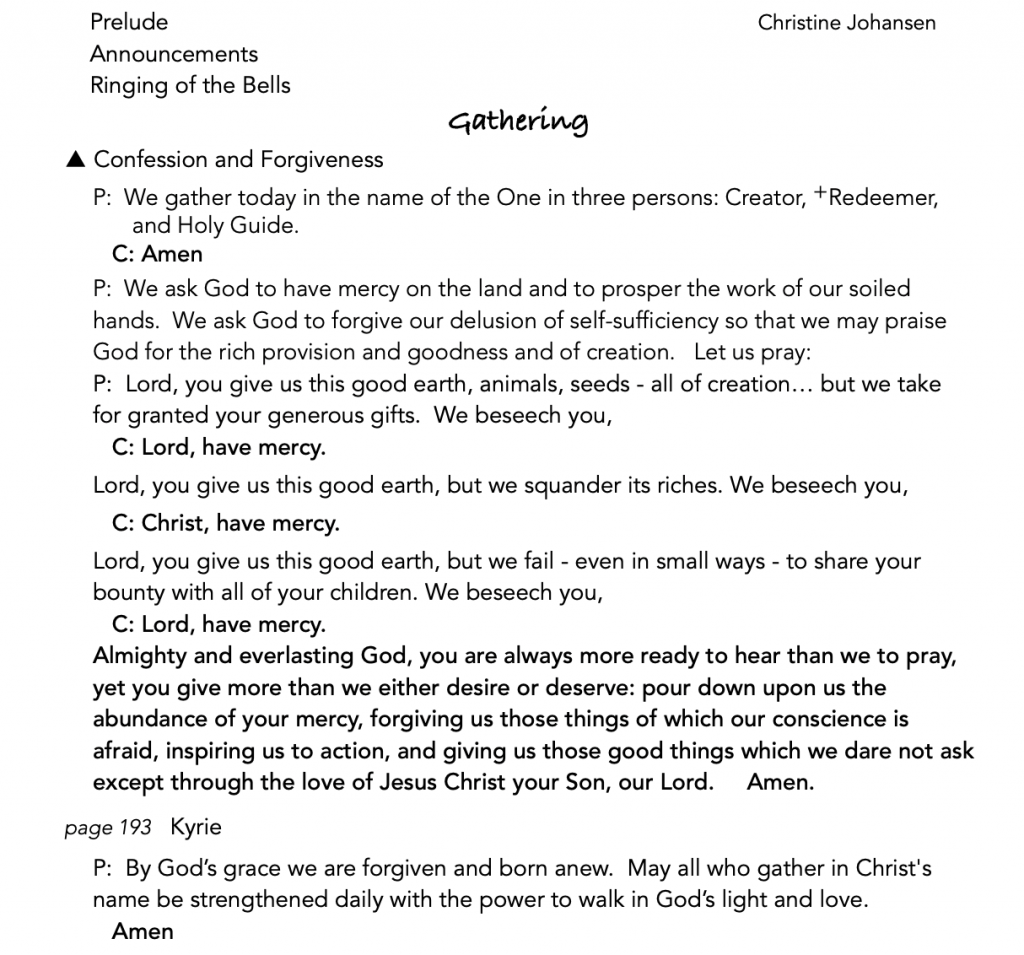
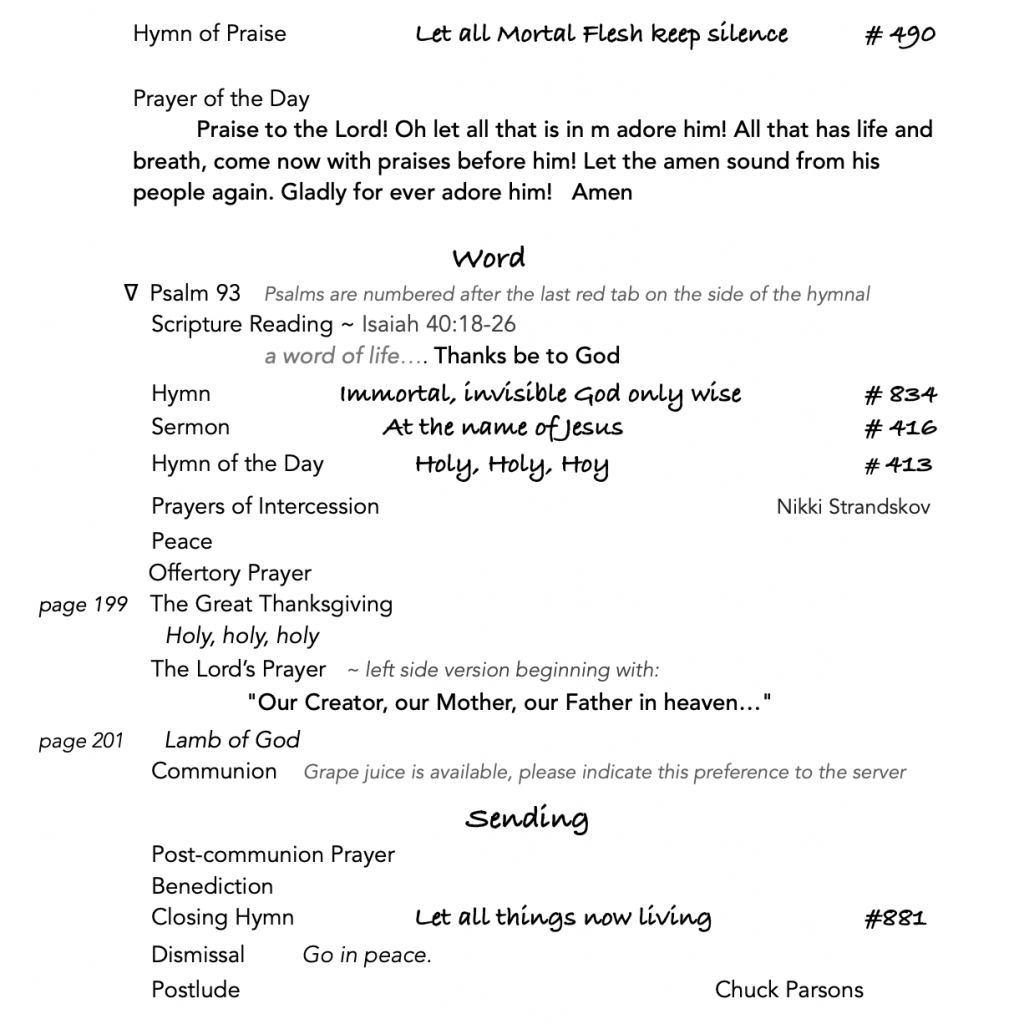
Today we begin a new series of sermon topics. In the past, I’ve preached on biblical images of God – shepherd, eagle, water, mother hen… I want to do something similar now, but in bigger categories. I want to look instead at the nature of God as presented in scripture and reflected in our hymnody. I’m introducing this in the announcements, because I want you to pay attention to the words you sing in all the hymns. I know from choir rehearsal that when we’re singing something new or not very familiar, all our attention is on the notes and we might not have any idea what words our mouths are forming, let alone make meaning from them. I think today’s hymns are familiar, so I’m asking you to think about what you’re saying and pay attention to the images that might come to mind as you sing.
#490 Let all mortal flesh keep silence
Thinking about the nature of God is an interesting topic to me, but I am a theology nerd – I know that. However, I think it might be important and interesting to normal people, too.
The way we think of God, the language we use, the motivations you might assign to God for things that happen in your life, the distance or closeness, the way in which we feel God acts in the world are all part of our personal spirituality – and determines or reflects (I’m not sure of the right word) how faith functions in any one of our lives.
I have organized these weeks spatially. Today, we begin somewhere beyond the universe. Imagine being outside on a clear winter night when starlight casts shadows on the snow. Looking up into the glimmering sky at all those stars and whirling galaxies in endless and expanding depth, filled with awe, you think, “God did that.” And you might echo psalm 8, “O Lord, our Sovereign, how majestic is your name in all the earth! When I consider your heavens, the work of your fingers – the moon and stars you have set in their courses, what are mere mortals that you are mindful of them, human beings that you care for them?”
That’s the God we are looking at today. The topic is Sovereignty.
The next topic will move in a bit closer – maybe to the level of rainbows spanning the earth and heavens, or the sun’s rays beaming down through a cloud as we consider the Transcendent, the hidden, but earthly experience of God. After that, we’ll consider Immanence – the indwelling nature of God, the closeness of God with us.
All of these aspects of divinity are found abundantly in the Bible – regarding both God and Jesus. There isn’t one that’s right, or better than the others, but they do have different implications for faith, and, as I said, for how it functions in your life – which is why it might get interesting.
The psalms are loaded with the language of the sovereignty of God. We will sing psalm 93 as a good example.
Scripture reading: Isaiah 40:18-26
18 To whom then will you liken God, or what likeness compare with him?
19 An idol? —A workman casts it, and a goldsmith overlays it with gold, and casts for it silver chains.
20 As a gift one chooses mulberry wood— wood that will not rot—then seeks out a skilled artisan to set up an image that will not topple.
21 Have you not known? Have you not heard? Has it not been told you from the beginning?
Have you not understood from the foundations of the earth?
22 It is he who sits above the circle of the earth, and its inhabitants are like grasshoppers;
who stretches out the heavens like a curtain, and spreads them like a tent to live in;
23 who brings princes to naught, and makes the rulers of the earth as nothing.
24 Scarcely are they planted, scarcely sown, scarcely has their stem taken root in the earth,
when he blows upon them, and they wither, and the tempest carries them off like stubble.
25 To whom then will you compare me, or who is my equal? says the Holy One.
26 Lift up your eyes on high and see: Who created these?
He who brings out their host and numbers them, calling them all by name;
because he is great in strength, mighty in power, not one is missing.
The sovereignty of God is the main difference that came out of the reformation between Martin Luther and the Lutheran tradition on one side, and the cluster of churches following John Calvin’s reform movement on the other side – Anglican, Presbyterian, Methodist, Baptist. For Calvin, God’s sovereign nature is the foremost attribute of the divine: the otherness, the power, wisdom, and might of God; the ordering of the universe, and predestination of all things from before the beginning of time. As sovereign, God is all-knowing, all-powerful, invisible, inaccessible – hid from our eyes. Let’s just sing it.
Hymn #834 is a classic definition of Sovereignty.
I picked out at least 10 hymns that demonstrate this facet of God’s being – we won’t sing them all – and I noticed that they are all hymns of praise and gratitude. Many are reworking of psalms. They are also mostly from the Reformed (or Calvinist) church tradition. Which makes sense. Calvin believed the psalms were the only faithful song form. They didn’t begin singing hymns until the mid to late 1700’s and even later in some denominations. So the hymns coming out of that movement would be about sovereignty. They are expansive, cool, clear, and distant. They are about eternity, Christ the King who is crowned with many crowns, victorious Lord of all. They speak of our soul’s upward longing, of God’s gracious provision. “Have you not seen all that is needful has been sent by God’s gracious ordaining? Ponder anew what the Almighty can do — if — with his love he befriend you.”
“If”. If?? Predestination was a big deal for Calvin. The Westminster Confession states:
“By the decree of God, for the manifestation of his glory, some men and angels are predestinated unto everlasting life, and others foreordained to everlasting death.
“…before the foundation of the world was laid, according to his eternal and immutable purpose, and by the secret counsel and good pleasure of his will,” …God chose some.
It continues in article VII: “The rest of mankind, God was pleased, according to the unsearchable counsel of his own will, whereby he extends or withholds mercy as he pleases, for the glory of his sovereign power over his creatures, to pass by, and to ordain them to dishonor and wrath for their sin, to the praise of his glorious justice.”
This is the Puritan, Anglican theology that formed our nation. People are predestined to salvation or damnation before the earth was formed. We can’t know what purpose that serves for God, nor can we tell one from the other by outer appearances. This preordained status can’t be changed or undone. It is part of the unsearchable, inscrutable will of God. You’re in or you’re out without any say in the matter.
One problem with this emphasis on God’s sovereignty is that it leads us to speculate about God’s hidden will, something that has not been revealed to us, rather than directing us to the ways in which God has revealed God’s self to us – through Word, Faith, compassionate human agency, the cross of Jesus Christ.
Martin Luther believed in God’s sovereignty, but that it showed itself in endless mercy. Lutherans confess that the Bible teaches God’s will is for all people to be saved, that salvation is solely through God’s action, and, that humans have the power to reject God’s offer. It’s a different form and feel of sovereignty.
I seem to have lost the reference for this quote. The article was comparing Lutheran and Calvinistic theology on just this point. I’m sorry I can’t credit it. “However it may have happened,” the author writes,”Calvinists became enamored with an appreciation of God’s sovereignty that is fundamentally flawed. They view God’s sovereignty as permeating all choices and all events persuasively and determinatively. In this way God’s sovereignty is a force in the universe that cannot be circumvented or refused. God “always gets his way the first time” because not only do all events occur under the domain of sovereignty but sovereignty determines that all events occur as exactly as they do. While it is true that all things occur under the domain of God’s sovereignty, it is false to assume that all things are therefore determined by God’s sovereignty. The reason is because the domain of God’s sovereignty includes genuine freedom.” ( * found it, see below)
Calvin did not believe in the freedom of human will. All things happen according to God’s will. As a biblical example, when in Isaiah 45, God is choosing the Persian king Cyrus to conquer Babylon and eventually free the Israelites from exile, he claims this.
“To Cyrus, whose right hand I have grasped to subdue nations before him and strip kings of their robes, to open doors before him—
For the sake of my servant Jacob, and Israel my chosen, I call you by your name, though you do not know me. I am the Lord, and there is no other. I form light and create darkness, I make weal and create woe; I the Lord do all these things.”
I grew up in Presbyterian and Methodist churches. I remember having conversations about predestination while washing dishes with my mom. It scared me as a young girl – it probably still does, because, even though I no longer believe that way, the fear that God didn’t love me was set as the default in my young understanding of God. Maybe I’ve become a pastor to learn myself out of my fear.
Let’s sing #416 At the name of Jesus. Notice the preordained, planned from the beginning of time, everything happens for a reason sense of calm. There was a plan, and it is all going to work out according to that plan. That is another tenant of Sovereignty.
There is one other feature of sovereignty that draws distinction between Reform and Lutheran traditions. In an article on What Lutherans Believe, the Rev. Aaron Simms reminds us “that it is God Himself who brings people to faith through the working of the Holy Spirit. So, even our faith is a work of God. To the question then, of why some people are not saved, even though Christ died for their sins and even though God wants them to be saved, Lutherans would answer, “We don’t know.” It’s a paradox that we don’t believe we can resolve. We often make a distinction between the “revealed God” – the aspects of God that we can know through scripture and by other means; and the “hidden God” – his hidden will that God does not show us. Lutherans believe that questions like why some people are saved and others are not, and why good people sometimes suffer and bad people sometimes prosper fall into this category of the “hidden God.” We can’t know or discover the answers through our own efforts, because God hasn’t told us the answers. In the end, then, we lean back on what God has clearly revealed to us and go from there.”
So instead of saying God willed disaster, illness, hardship, abuse or evil to happen in our lives as part of a predestined plan, Lutherans say, we can’t know the why, but we do know that God grieves in the scriptures, and that God in Christ promises to be with us in and through our suffering. And God’s Spirit works in and through our helpers to comfort and bring aid.
The questions I want to examine in each of these realms of God are what do we gain – and what do we loose if we see this topic as the primary definition of God?
In complete Sovereignty, we lose our sense of agency. If God does everything and wills everything that happens then why should we bother? This has led to much misery and allowed much evil to flourish. Lutherans, Reformed, Roman Catholics, non-religious are equally guilty of this, but you can see it in this theology.
If God will take care of it, then I don’t have to do anything. I don’t have to speak up, or step in, or offer my meager help, or change my behavior. God will see to it.
If it is by God’s will, then slavery (for example), or any exploitation of people and nature, must be fine, because it exists, therefore, it is part of God’s plan. The status quo is ordained and meant to be, or else God would change it. There is a pacifism that is dangerous — trusting too much in the absolute power and will of God negates inspired human agency. God’s will allows/is responsible for evil in this belief system.
What do we gain by accepting the sovereignty of God?
There is an overwhelming sense of awe and shifted perspective – it is not, actually, ‘all about us’ – which at times can feel very restful. “God’s got this,” in modern lingo. Looking into that night sky we gain a sense of majesty that lifts us above earth’s troubles. There is comfort in the fullness of all things, mystery in the things of God and the world that are only slowly revealed if at all. “Let go and let God” – God is in charge – not micromanaging the details, not countering the laws of nature to keep us safe, but God is all in all, and there is no other.
And obviously, we have gained beautiful hymns through the Calvinist, Anglican, Welsh, Scottish traditions. Grundtvig’s sovereign streak gave us Built on a Rock and The Word.
Let’s sing another sovereign classic, #413 Holy, holy, holy, Lord God almighty.
*Posted in Calvinism and Sovereignty | a theology in tension March 17, 2012 by StriderMTB